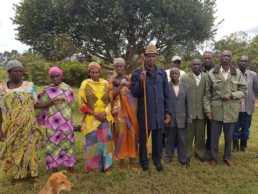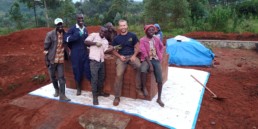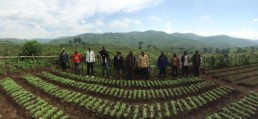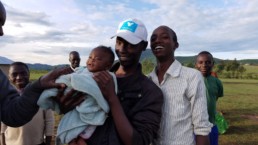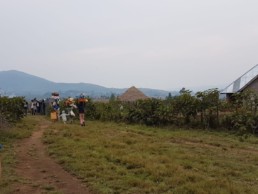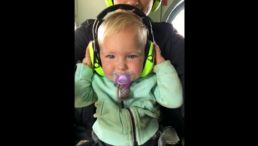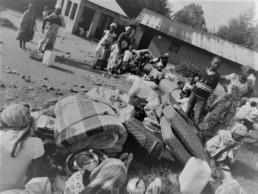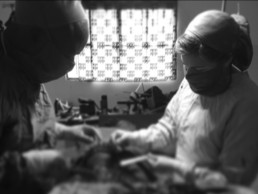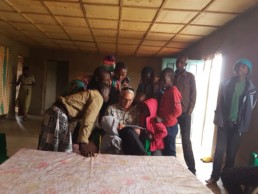“See You After the War”
I was prepared to send an update about the many positive projects that have happened here in Minembwe in spite of the current conflict, but things here became worse than “worser.”
We ended our last update with us all being in the neighboring country of Burundi. Miles was able to return to Minembwe on September 26 and, on October 5, our friend Patrick (from Wenatchee, WA) and I made our way to Minembwe via a road trip then an airplane.
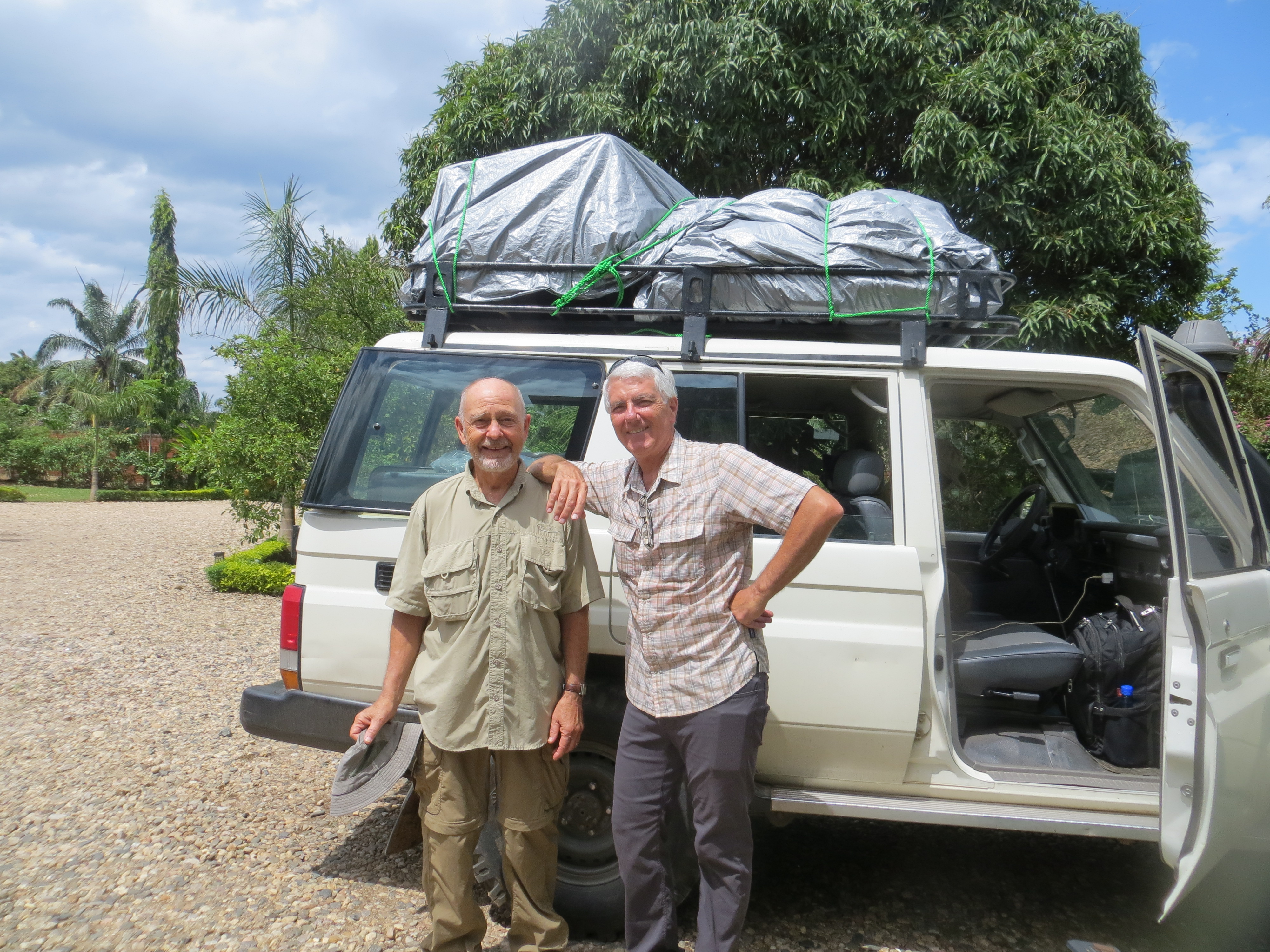
Bob and Bing on the road to Goma.
Patrick’s wife Thelma remained in Bujumbura with the rest of our family, because Lisa and Aimee were being treated for E. coli infections and Sophia had a Urinary Tract Infection after being treated for a kidney infection. The girls are now fine, but Lisa still needs to be retested as she has just finished her latest round of medication.
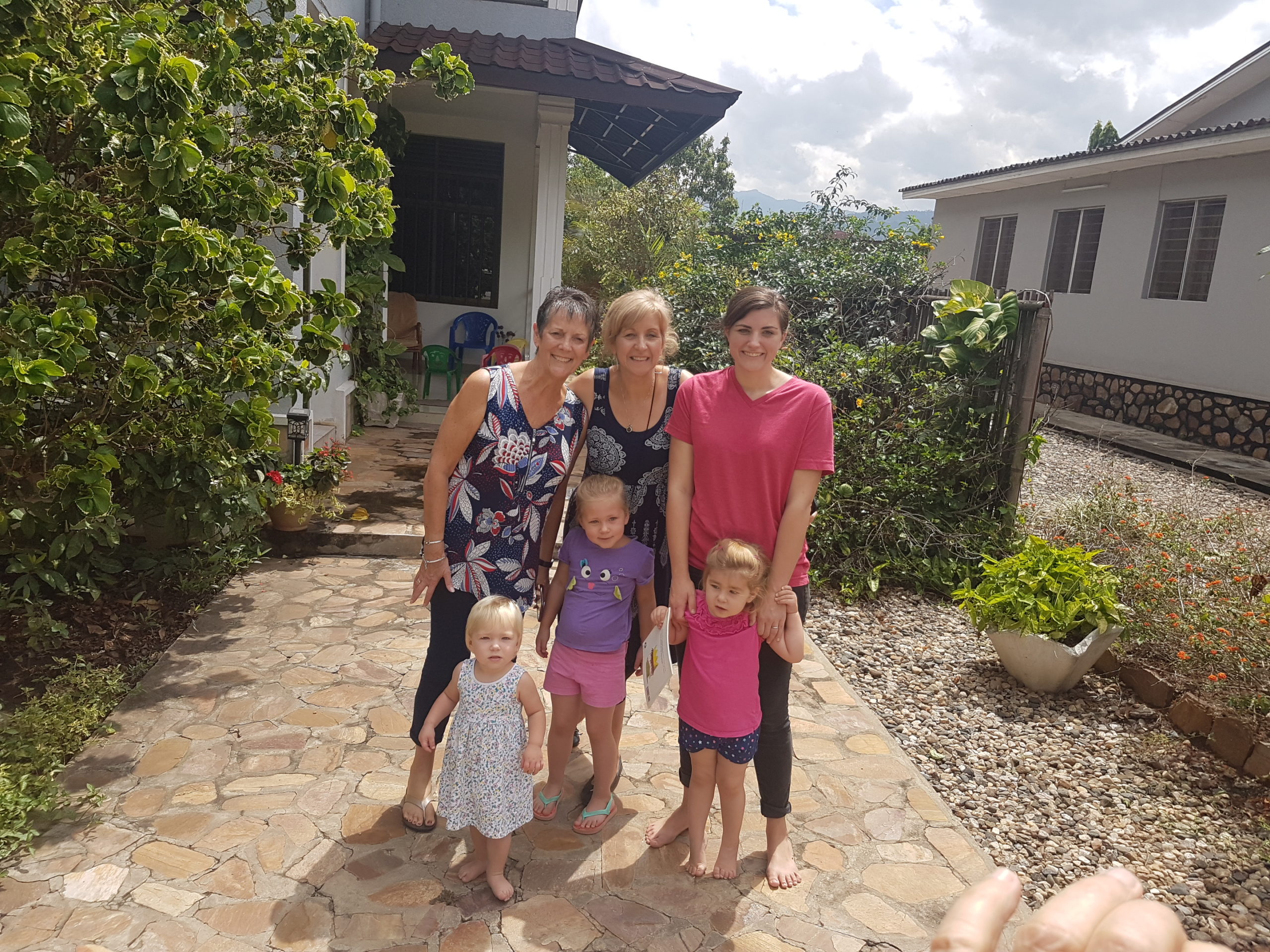
Those who were left behind.
A few days before Patrick and I were to leave Bujumbura, we heard through Miles and others that the ongoing conflict was starting to intensify in Minembwe. In the far-flung areas of Minembwe, where the local cowboys take their herds to graze during the dry season, the Mai Mai were (and still are) hunting the “cowboys” and their cows. In August, Namajana, who daily works alongside of us, lost her brother, cousin, and a friend, who were herding their families’ cows to market when they were kidnapped and eventually executed by the Mai Mai. Then in early October, a couple of days after Patrick and I arrived, Namajana, along with her whole family, lost ALL the rest of their cows to another Mai Mai attack; those cowboys were also shot and badly injured. There are no banks here and nowhere to safely stash your cash—your cows are your “savings,” the pasture is your bank, and the cowboy (typically a family member) is the bank guard. Recently, most people brought their cows back to our area, but the grass here isn’t very nourishing, and there is little of it growing due to the very late fall rains. Sadly, cows are dropping right and left, carcasses are everywhere as, for some reason, no one buries them; the stench can be overwhelming.
The situation here is that the Mai Mai rebels have joined forces with a notorious rebel leader who seems to run around Eastern Congo without much resistance. To this, add a RUMOR that some within the DRC government wouldn’t mind seeing a genocide, or at the least a forced exodus of the Banyamulenge people who are the main tribe within Minembwe. To that, add that some within the FARDC (the DRC army) seem to be holding the door open for the rebels versus chasing them away. The local UN peacekeepers are severely limited in how they can respond having a mandate to protect and stabilize, but they are restricted to assist only when the FARDC engages, which doesn’t happen very often. On top of all of that, add that a “defense army” of Banyamulenge men from other nearby countries, such as Kenya, Uganda, Rwanda, and Burundi, made their way here to battle the Mai Mai. This would be positive news since the FARDC army rarely intervenes, however there was a RUMOR that this Banyamulenge “army” planned to “enlist” local older boys and young men (via threat of death) to join them in defending their homeland and people. So… the people here are afraid of the rebels, afraid of the army, afraid of the government, and sadly, also afraid of the “army” that came to save them.
As for the real army, the FARDC soldiers are under paid and rarely paid, so stealing and looting is how they survive. The sad joke is that one group of soldiers are called “The Android Army” because they steal “smart” phones from people, but they also smash the non-android/non-smart phones that they take from people. This is NOT a rumor as we know people here who have lost their phones to soldiers in this way, and we know that the soldiers have been roaming through the Friday market taking items from vendors. When the vendors try to protest, the soldiers put their finger to their own lips to indicate that these people need to keep quiet about it. Everyone knows that you get a beating if you don’t comply.
In our community, many people have already fled, but there isn’t a guaranteed secure route to take to hike out of the area—you’ll either be hunted by the Mai Mai or extorted by the FARDC soldiers who monitor the road and exact taxes from those using the road. Busy Bee Airline, who for the last year and a half have flown scheduled weekly roundtrip flights from Goma to Minembwe, is completely booked for at least the next four weeks. We don’t know where people are getting the money for tickets because to buy a ticket you need to sell a cow, and no one is buying cows because people can barely keep the cows that they already own alive. Also, because few people are wanting to fly INTO Minembwe, ticket prices out of Minembwe, formerly $150 one way, have risen to $260.
Five days after I was back on the ground here in Minembwe in October, I was saying goodbye to one of the young men who was fleeing due his fear of the Banyamulenge “defense army” enlisting him. I said, “Hopefully we’ll see each other soon.” His reply was, “Yes, see you after the war.” A few days after that, as another good friend (from the Moshi tribe) was leaving us, his parting words to Miles, speaking of the Mai Mai, the FARDC, and the “defense army” were, “Don’t worry, no one is going to kill you, they will just steal from you.” Thanks to a text that Lisa sent to me right when I got back up to Minembwe, every time I go to bed, the words of her text go through my head… “Goodnight, and don’t let the Mai Mai bite.”
Eventually, everyone found out that the rumor of the Banyamulenge “defense army” forcing young men and older boys to enlist in their army was false. Sadly, many young men and older boys had already fled Minembwe, which had to be a difficult, if not a dangerous journey, and costly in terms of the money needed to travel, plus the high cost of living in a city. Plus, if these young men had stayed, they might have found some courage to stand against the enemy, or at least support those who are defending, which would have allowed them to celebrate a victory if that ever comes to pass.
On October 28, Miles was scheduled to leave on the helicopter to travel to Bujumbura to be with his family. As happens so often, his flight was canceled due to the helicopter needed to transport wounded people to a hospital. Miles next two flights were also canceled, but he finally was reunited with his family on November 5. Lisa and Thelma had flown up to Minembwe on November 3.
The attacks on the Banyamulenge people are coming from the north, south, east and west, so thousands of people have nowhere to go and are fleeing to our area of Minembwe. We’ve got a humanitarian crisis brewing here; there was already a food shortage. In addition to this, the refugees are bringing what cows they still have, but our area cannot support all these cows, and many of the cows are running amuck in the planted fields and gardens eating or destroying the crops that are so desperately needed.
A few months ago (right before this crisis), we started buying beans and corn to store up, hoping to sell them later when prices increased and use the money to support the orphans and pay teacher’s salaries. But now we have thousands of hungry refugees surrounding us, so we and the university are working with the leaders of villages that have fled to distribute the beans and corn to those in need. You would think that the price of beans and corn would skyrocket, but no one here has money to buy anything, so we are trying to buy more beans and corn to distribute while prices are still low.
 Our stock of beans and corn.
Our stock of beans and corn.
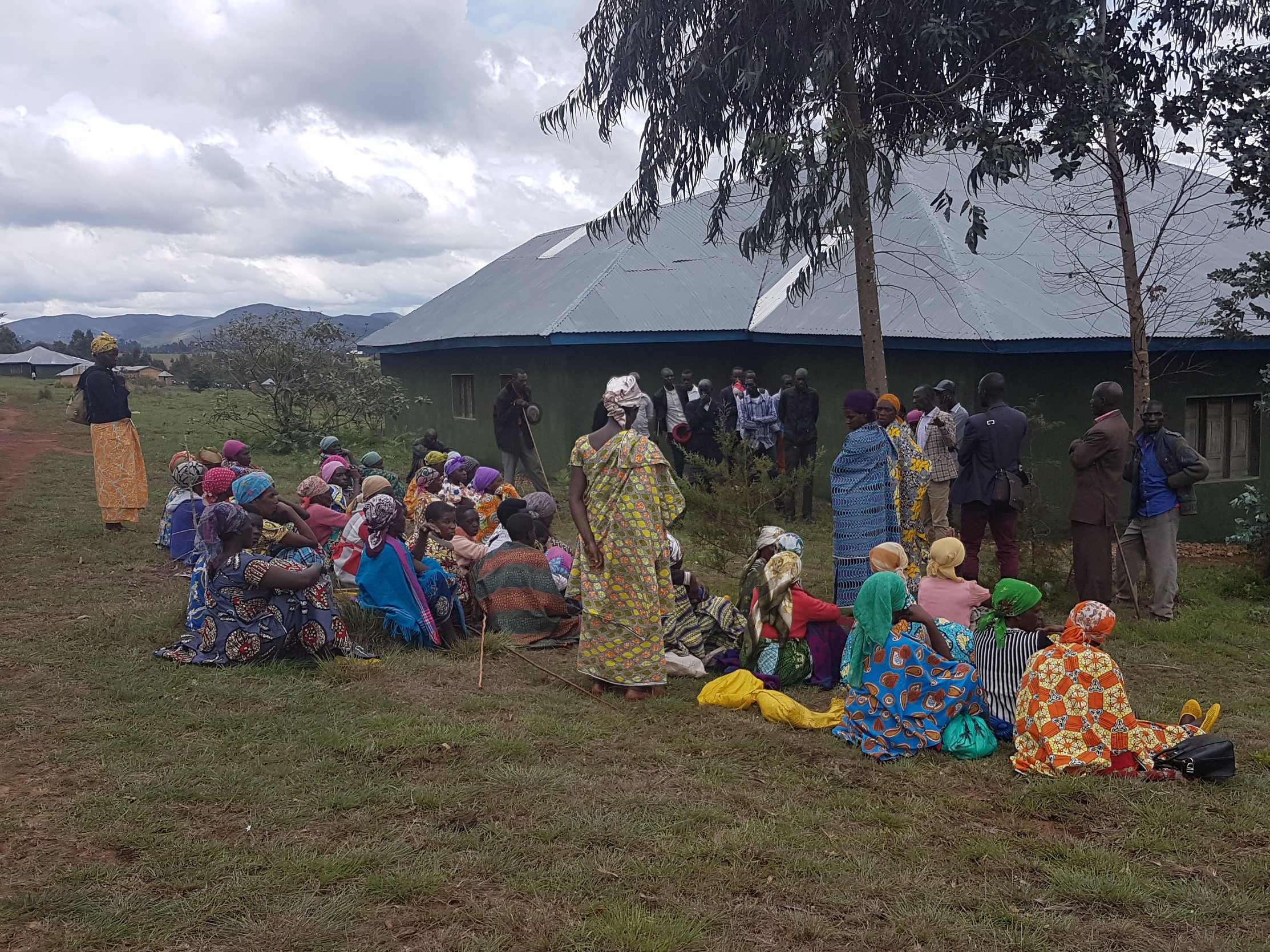
This day we eventually distributed beans and corn to 156 families, which amounted on paper to 982 people.
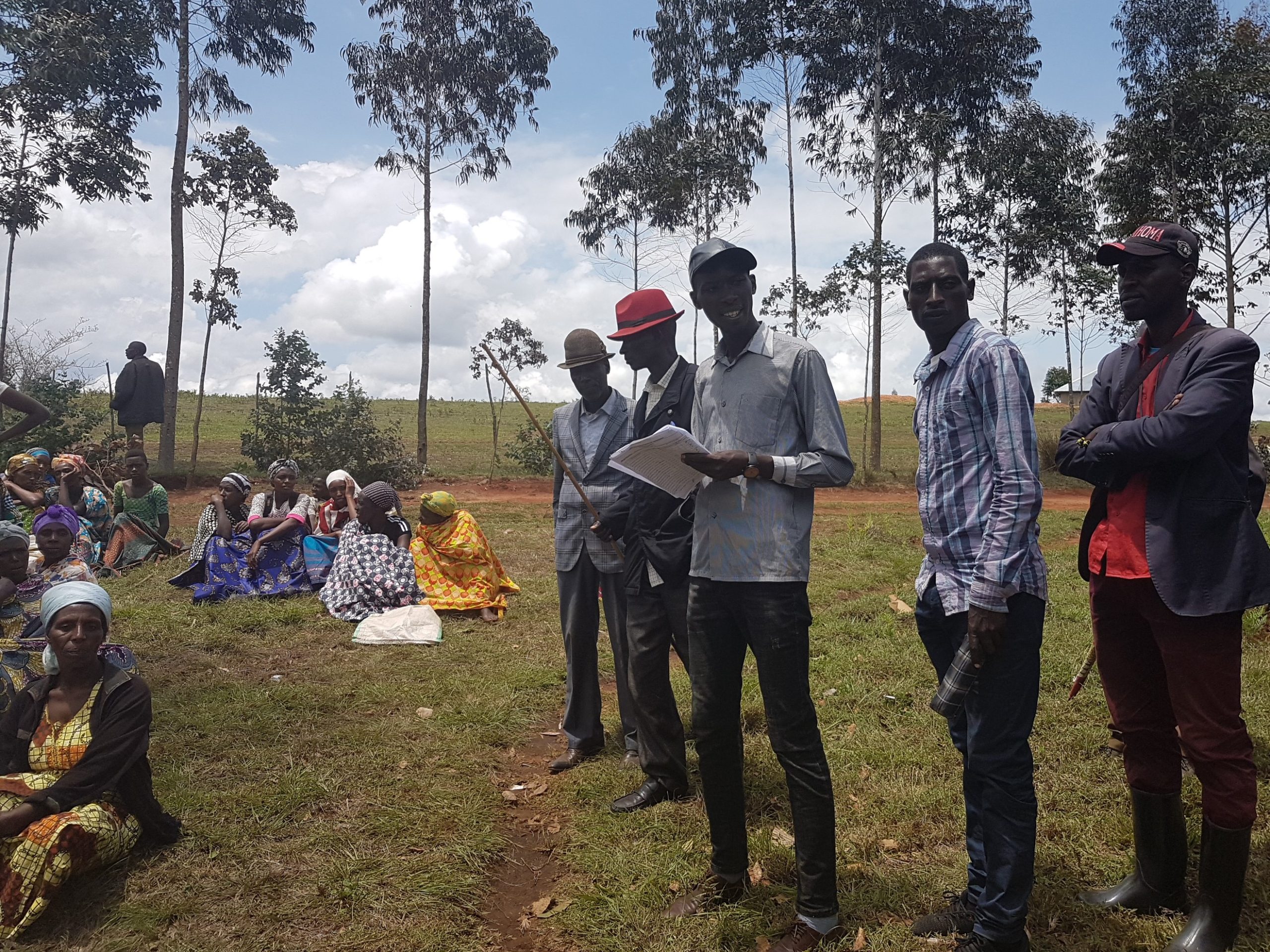
The people that we work with from the university are very organized and now have much experience distributing food.
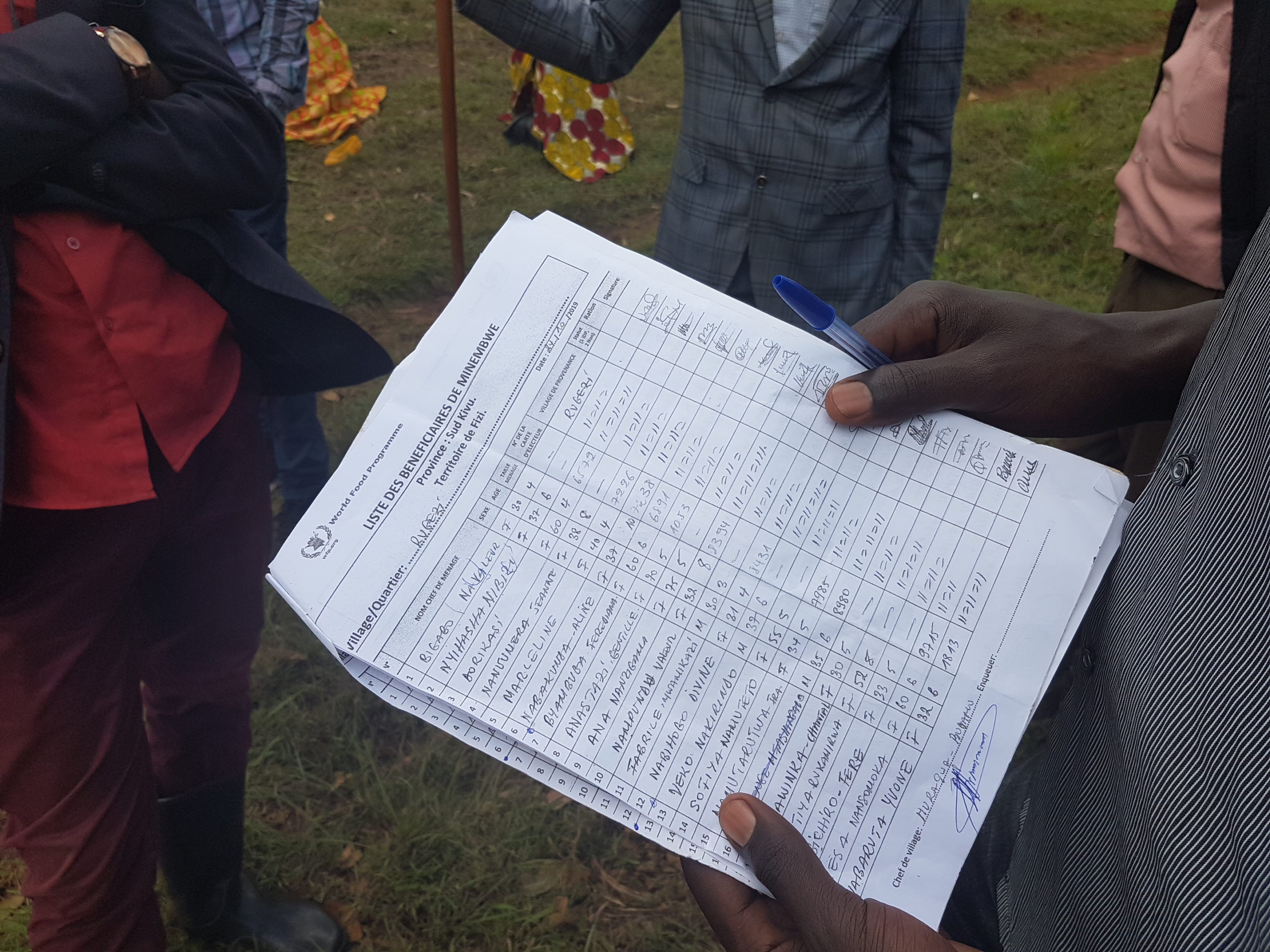
The village leader of the refugees worked alongside of the university to come up with a verified list of refugees.

The refugees themselves did most of the work; they were polite, caring and hardworking.
No refugees have been left to sleep outside as every refugee has been crammed into a home in our area, a common practice that has been used here over the years. Last week, we visited two of the villages that are sheltering refugee families to take note of their situation, especially with regard to all the babies.
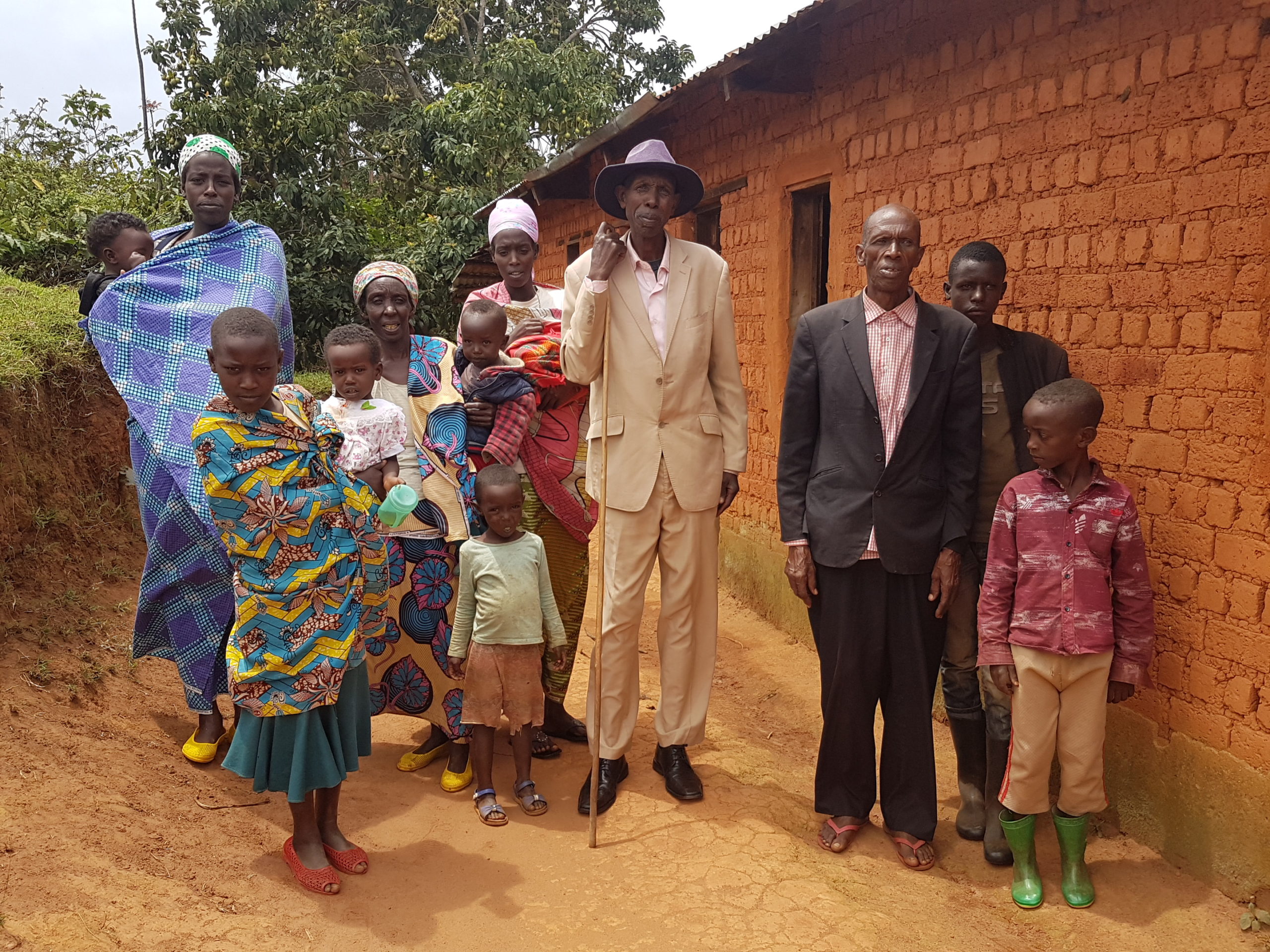
Every family was thankful that we came to inquire upon their situation.
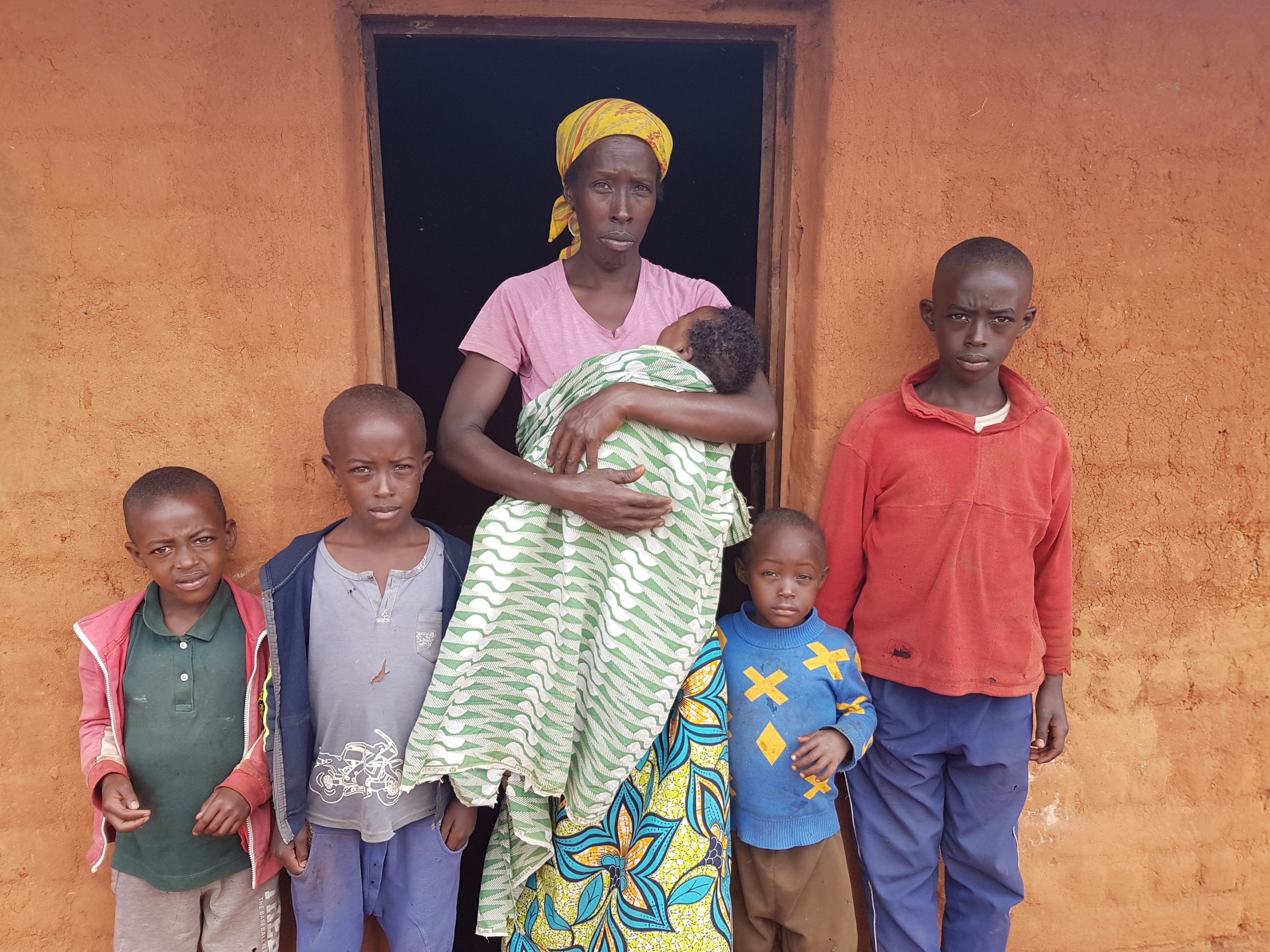
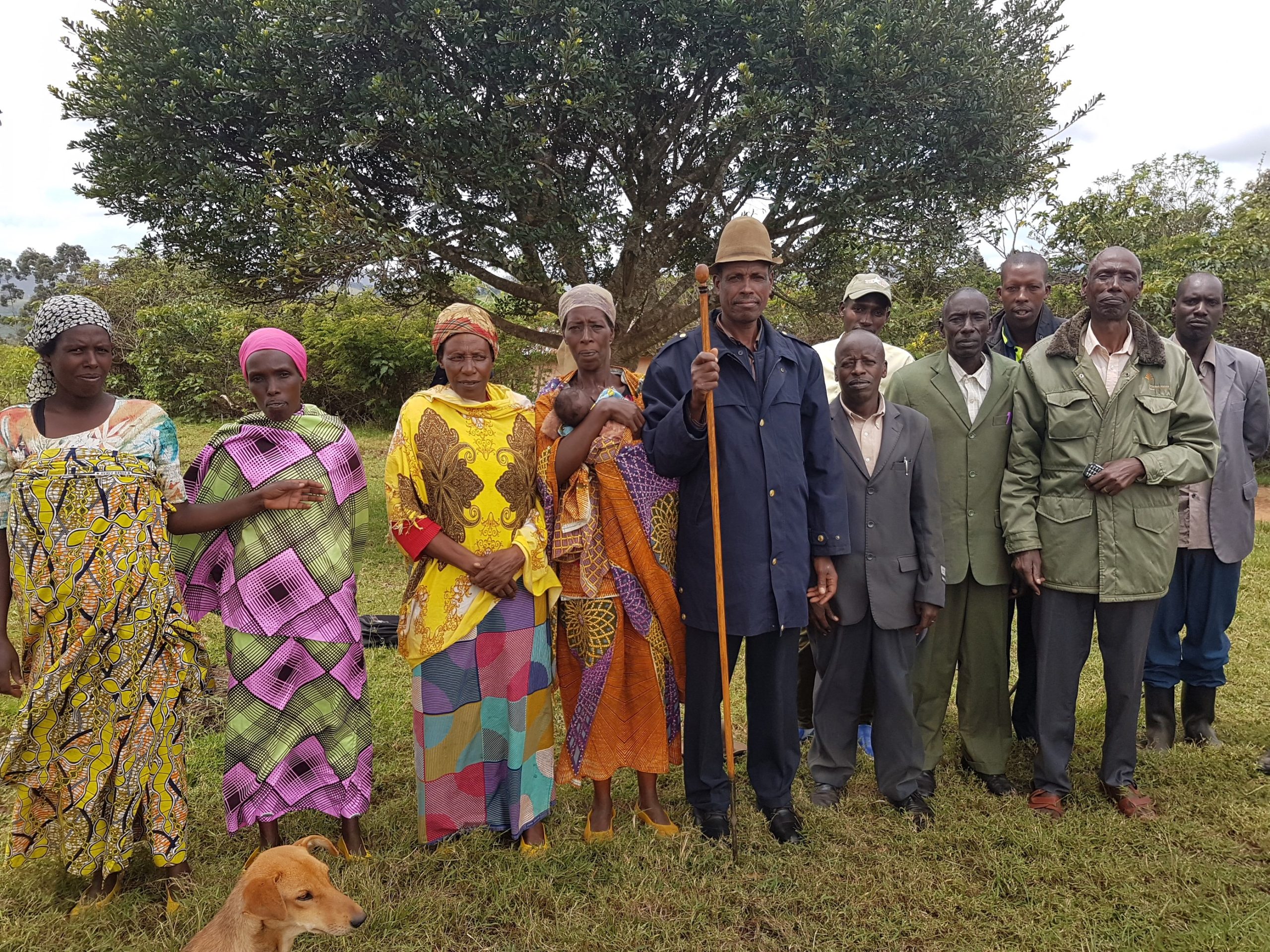
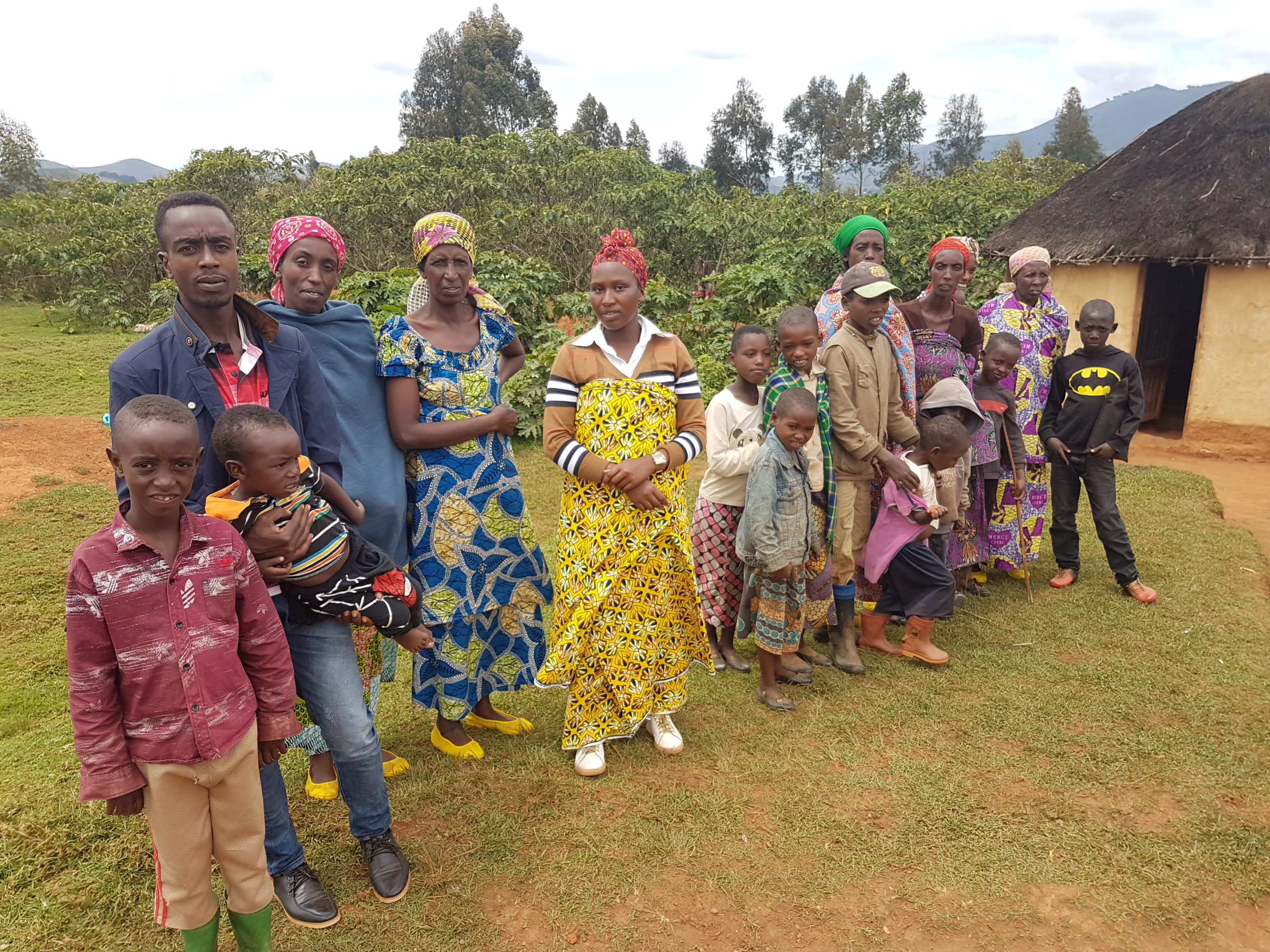
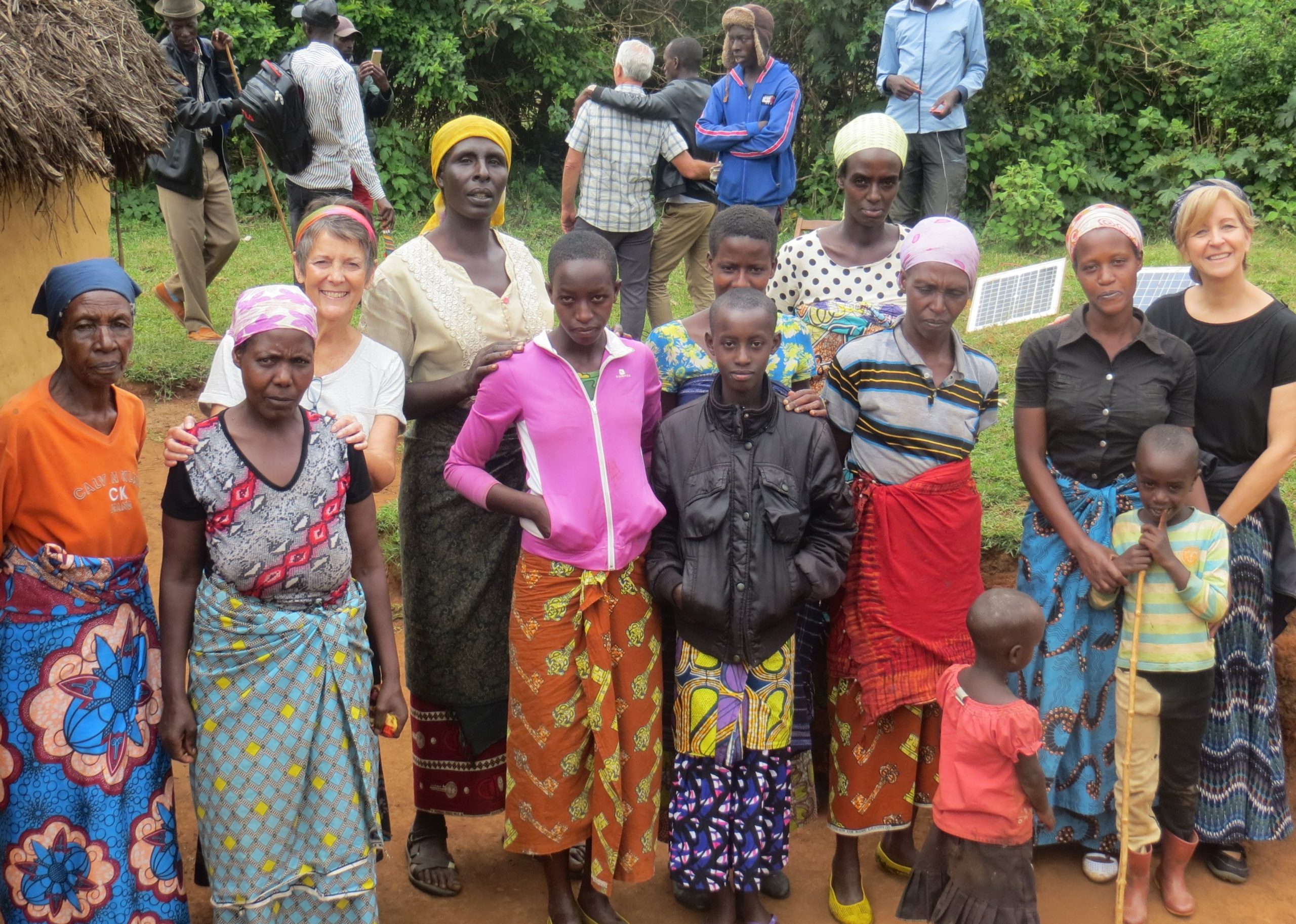
Patrick and Thelma distributed all of the baby blankets and knit hats that were made by friends back in Wenatchee, Washington. We could have given away dozens more; at least four babies have been born to these families just in the last week.


If the situation here in the center of Minembwe stays this “calm” then Miles will bring his family back up to Minembwe, hopefully as soon as the first week of December.
Somehow. - Michael
He Creates Chemistry
Miles is in the process of making bricks for his family’s home, as well as needing to make bricks for the many buildings we’ll be using in future projects.
Back in February, Miles traveled to Uganda and brought back a brick/block-making machine to Minembwe, something that, at least as far as we know, has never before been used in Minembwe.
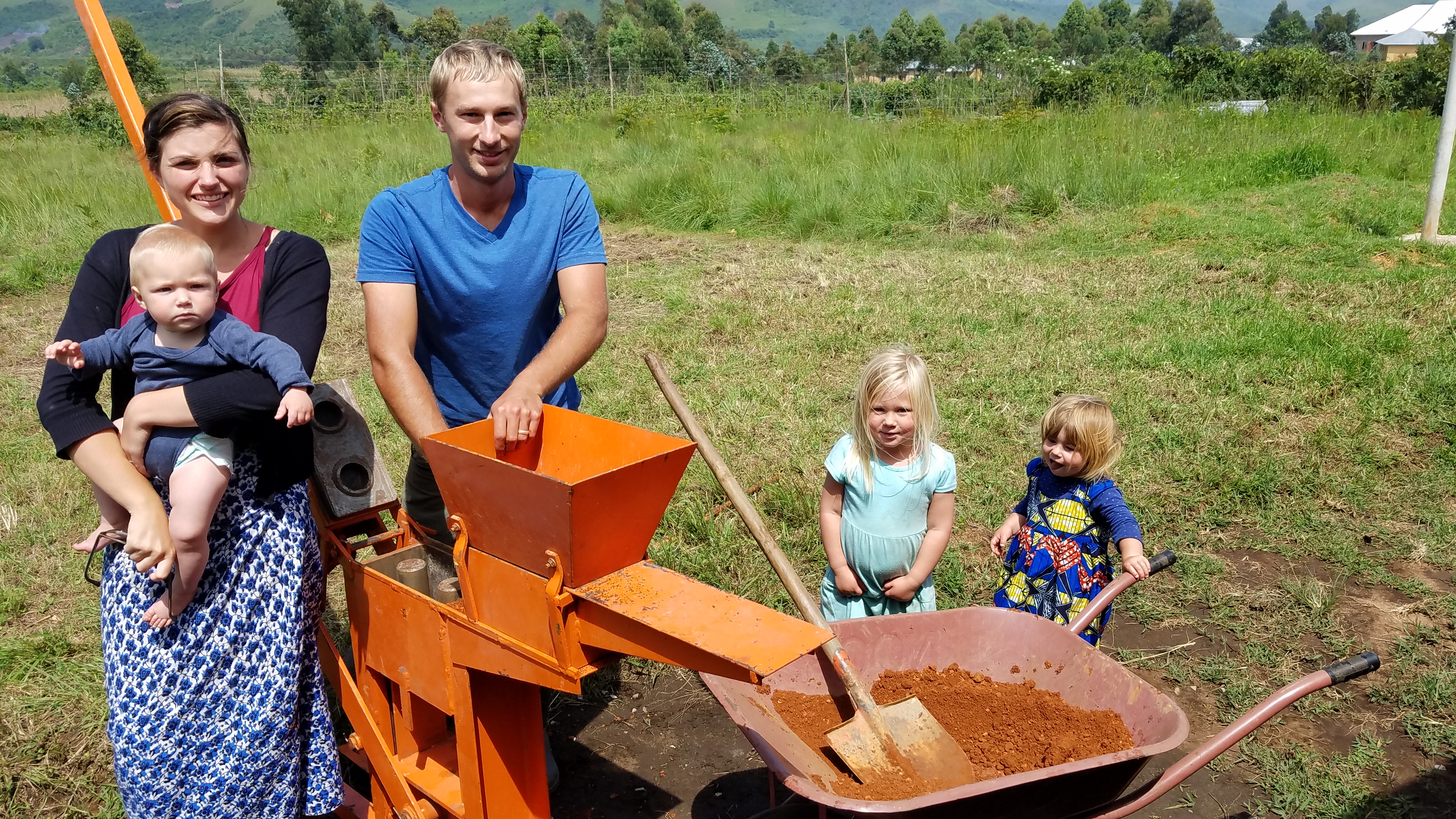 The day the brickmaker arrived in Minembwe
The day the brickmaker arrived in Minembwe
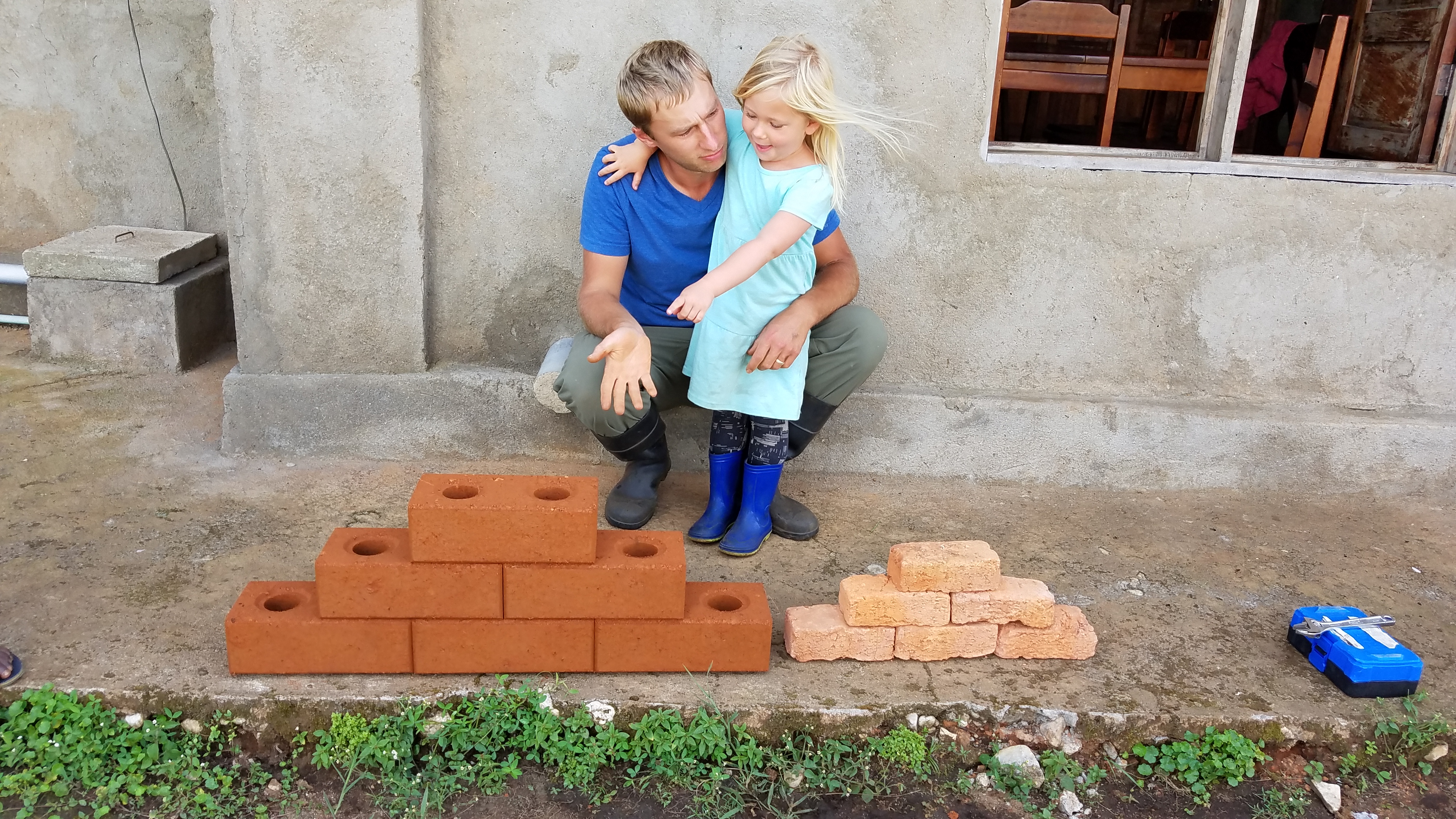 Deciding which style of brickmaking is superior
Deciding which style of brickmaking is superior
New to brickmaking, Miles began experimenting with different mixes of soil, sand, cement, and moisture, as well as the best way to cure the bricks/blocks. Less than a week later, Lisa and I left Minembwe to head to Wenatchee, WA, for my prostate surgery.
On the way to Wenatchee, Lisa and I stopped in Los Angeles for a few days to see my mom, sister, and others. While dining at a restaurant owned by Brian, a school friend of mine from grades K through 12, Brian sat down with us and asked about what we were doing in Minembwe. Talking about our need to make good quality bricks, Brian said he would put us in touch with his niece who works for the chemical company BASF, whose motto is “We create chemistry.” Brian’s niece then hooked us up with a BASF scientist who knew dirt (mining/tunneling), who then pulled in another BASF scientist/chemical engineer into the mix who knows bricks. Four days after my surgery, these guys are on the phone with us providing all sorts of information, guidance, and inspiration, which we immediately relayed back to Miles in Minembwe so he could continue to experiment with the composition of his bricks.
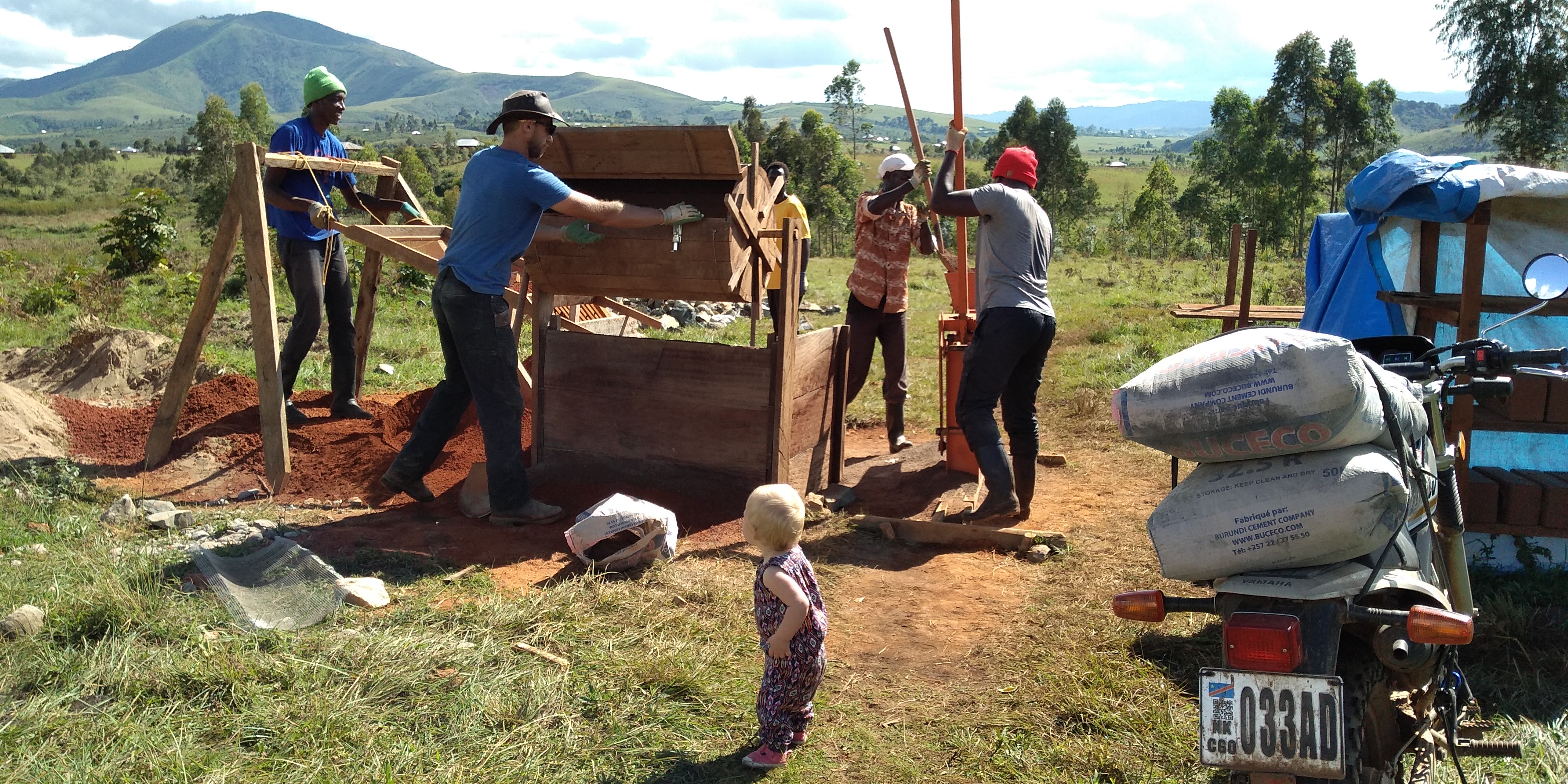
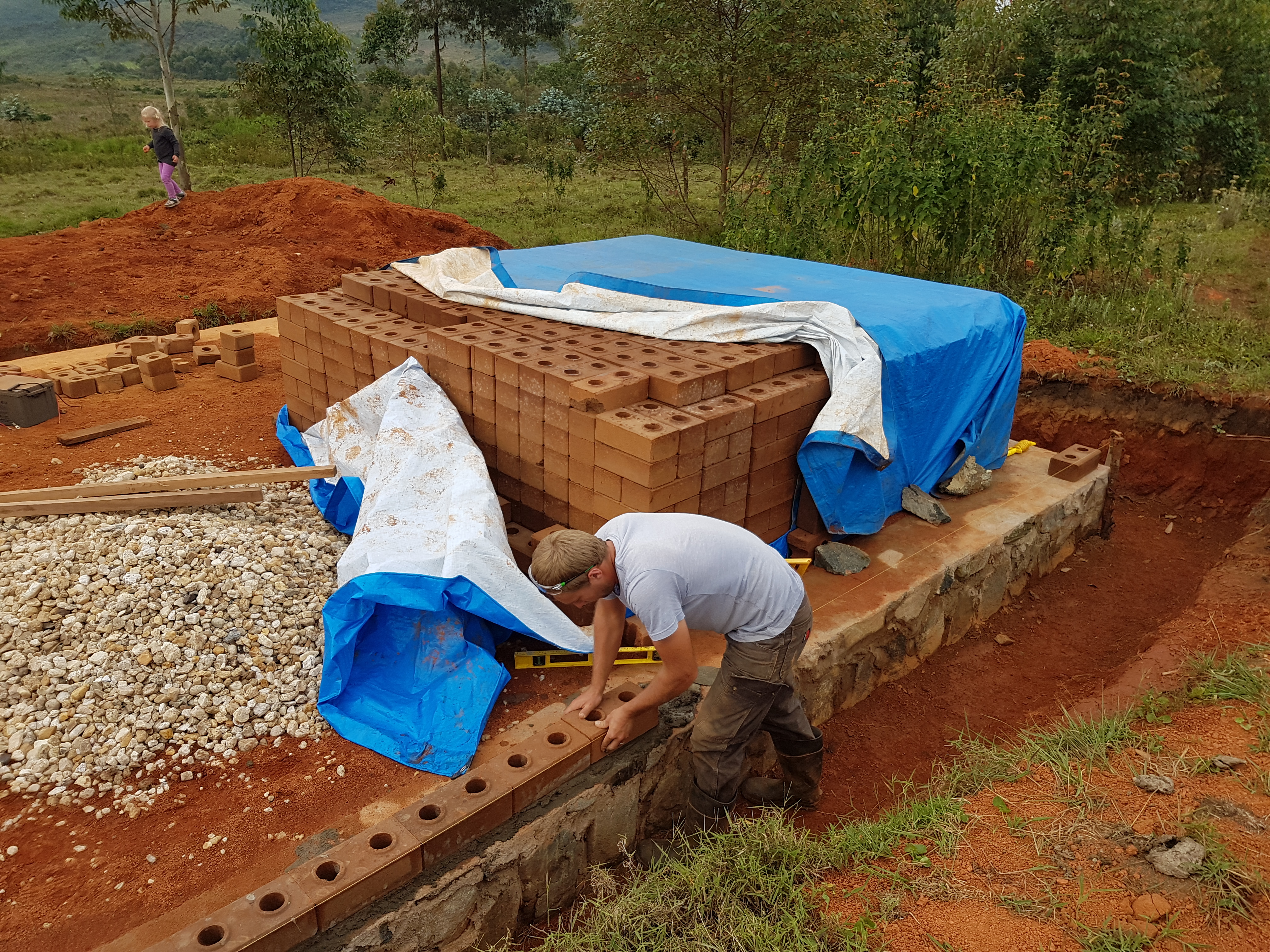
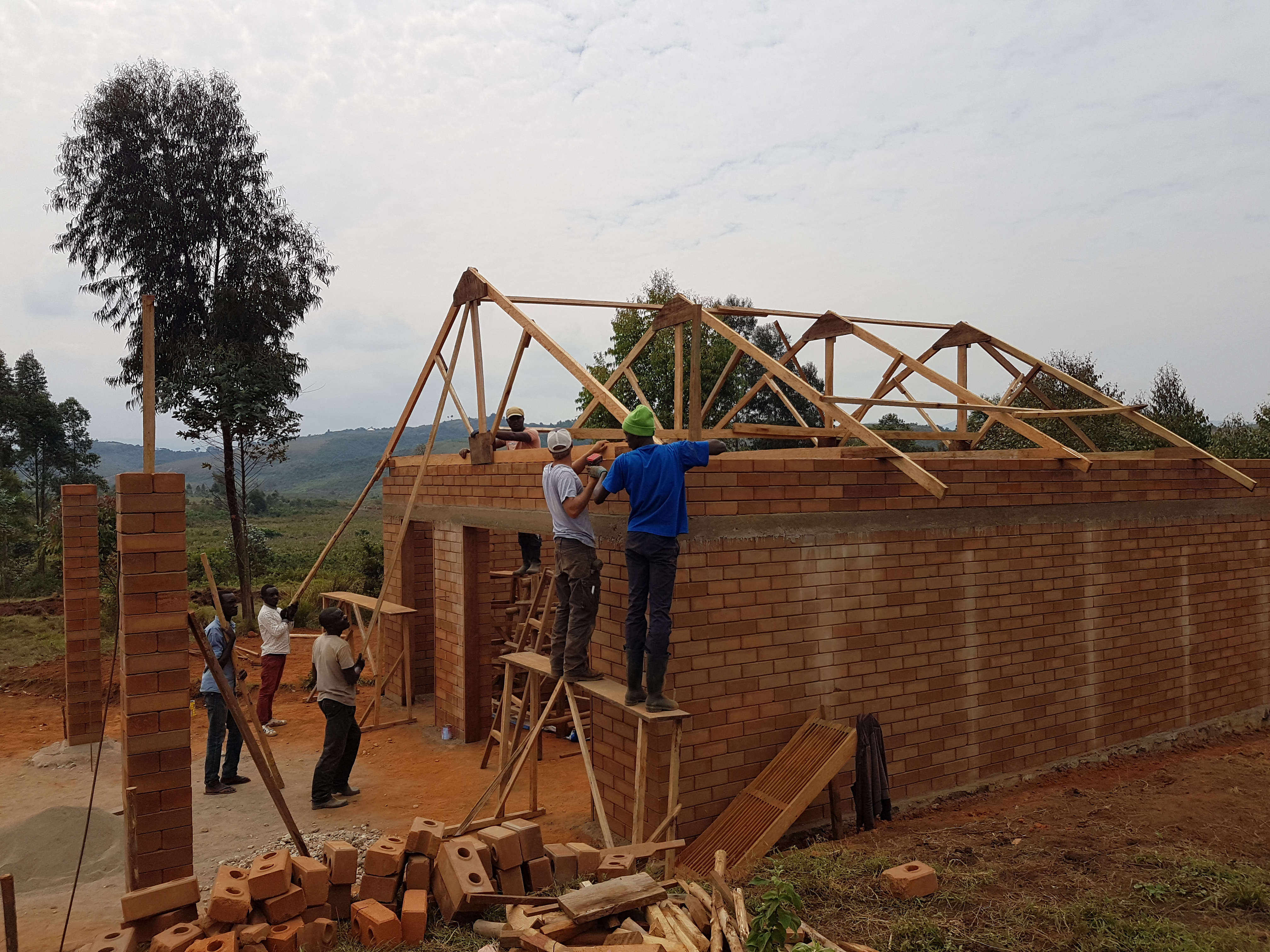
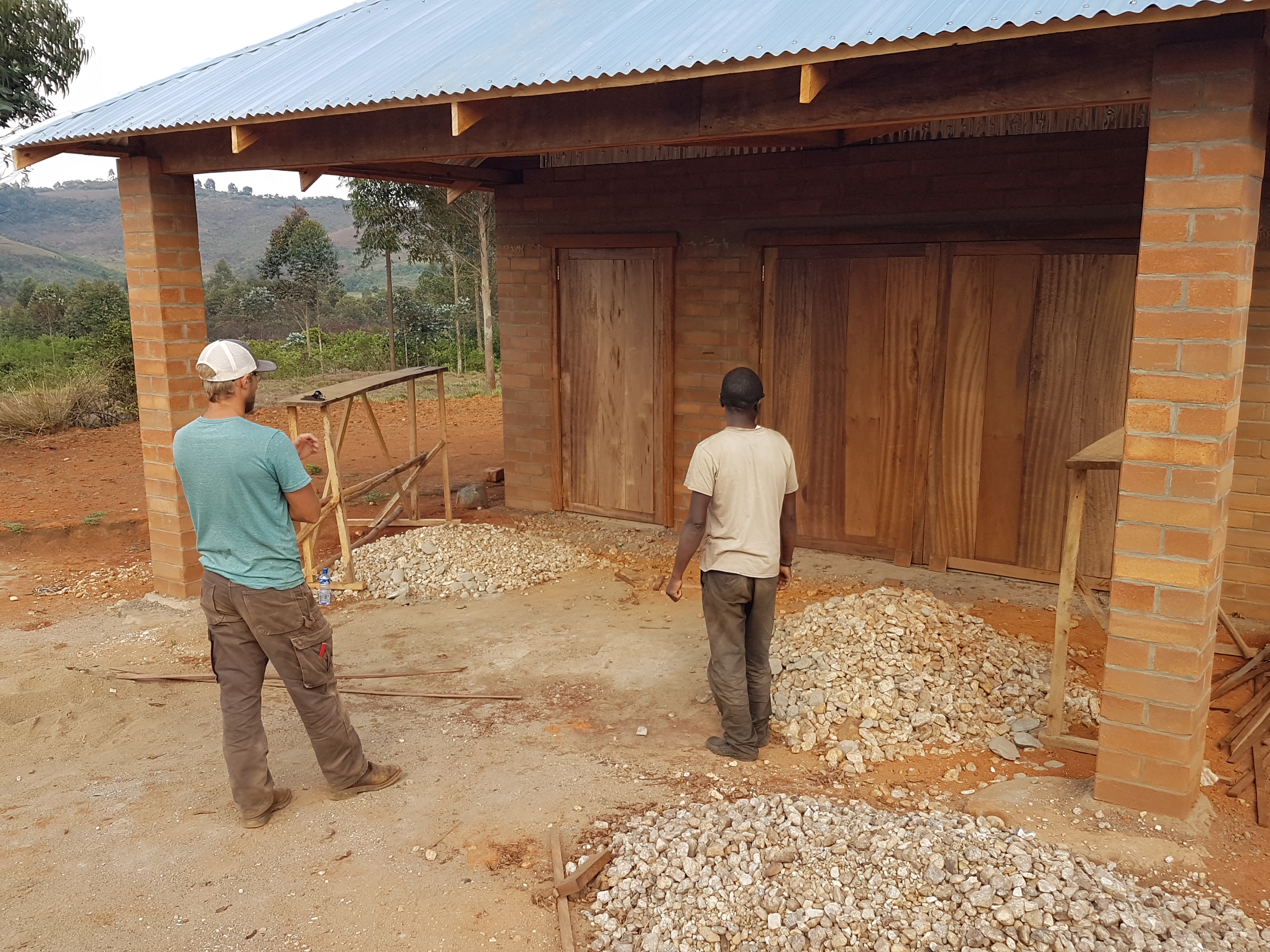
Miles’ first building was his shop, which will store the drying bricks and wood he will need to make their house, his tools, and our motorcycle that has been stored nightly in our living room since December. Once the house is built, the shop will also become a place where Miles can train others.
Inspired by the fact that our “team” is not just limited to those of us here in Minembwe, and that it is far bigger than we can probably imagine—we have a proposal! If anyone reading these blogs has anything to share with us regarding what you see us doing, or what we’re attempting to do, please contact us at LaOlamAfrica@gmail.com. Our new team motto… “He creates chemistry.”
Somehow!
Michael
From Bad to "Worser"
Life in Minembwe recently got crazy very quickly these past few weeks. First, the girls, Bella, Sophia, and Aimee, got sick with high fevers. With very little testing available in Minembwe, the UN allowed them to travel out via the helicopter to Uvira, DRC on September 5, along with Emilee and Lisa. They all ended up just across the border in Bujumbura, Burundi, our normal "go to" spot of resupply. The girls were tested; Aimee had a bacterial infection, and Sophia had a kidney infection. Bella's feeling better, but it was never determined what was ailing her.
Immediately after the ladies and girls left, things went from bad to worse in Minembwe, as the Mai Mai rebels began yet another campaign, as they did in March and May, to try to take over Minembwe. Miles and I kept working hard through this latest conflict on various community projects, the building of Miles’ shop and house, the garden projects at the volunteers’ house, as well as trying to help the community cope with the current crisis. During the week, things went from worse to "worser," and then on Friday, Sept 13, things got extremely tense and the UN peacekeepers requested that Miles and I evacuate to their base. We grabbed our already packed "getaway" backpacks and went to the base, which is 1.3 miles or about five minutes by motorcycle from the volunteer house. Due to the escalating situation, the UN had to fly some personnel into Minembwe the next day, so on Saturday morning they told us that Miles and I were flying out in a couple of hours.
Our family was happy to know that Miles and I would arrive in Bujumbura on Saturday afternoon. But, leaving behind our Minembwe “family” was a horrible feeling; pretty sure that I would not be capable of leaving them in the future should this situation arise again. Told by the Mai Mai they would be slaughtered where they stood and knowing they were without the help of the DRC army, the locals were unexpectedly able to fight off the Mai Mai (killing the Mai Mai leader) that very day. There are a lot of politics and tribal issues in Minembwe and throughout DRC, so depending on what tribe you hail from, you don’t want to wait on the DRC army to help you.
We’re waiting on news regarding the stability of Minembwe. Our partner Lazare went up on Thursday, and Miles is hoping to head back up this coming Monday. If Miles gives us the “thumbs up” the rest of us will follow shortly thereafter.
…And Those Who Ate Were About Three Thousand
In late July of 2018, we visited with and partnered once again with a Vacation Bible School (VBS) program in our hometown of Leavenworth, Washington. The focus of the VBS project was to provide much needed agricultural training, seeds, and tools to 50 of the poorest families in our immediate area here in Minembwe. The thought of doing this for even 50 families seemed a bit overwhelming, but we have great people to work with here in Minembwe. The fundraising went so well that we had enough money to run the intended program and we were hopeful we could repeat it again in the near future for many other families.
Two months later we arrived back in Minembwe, and as so happens in Africa, we found the area involved in a crisis. A rebel group attacked north of Minembwe and tens of thousands of refugees had fled into our area and the surrounding villages. There was an immediate need for food; this need was exasperated by already poor crops due to weather. Compounding this issue was that many people had sold off most of their crops to quickly make some needed money rather than storing their harvests for food to be eaten later or seeds to replant. Food prices here quickly doubled, and then tripled.
We decided to initially use the money raised during the VBS to address the immediate problem of feeding thousands of refugees. Working with the Eben Ezer University’s agriculture department, several students were trained in the planting/growing process of quick high yielding food crops, then the students assisted in planting nurseries within three local villages where the bulk of the refugees had temporarily settled.
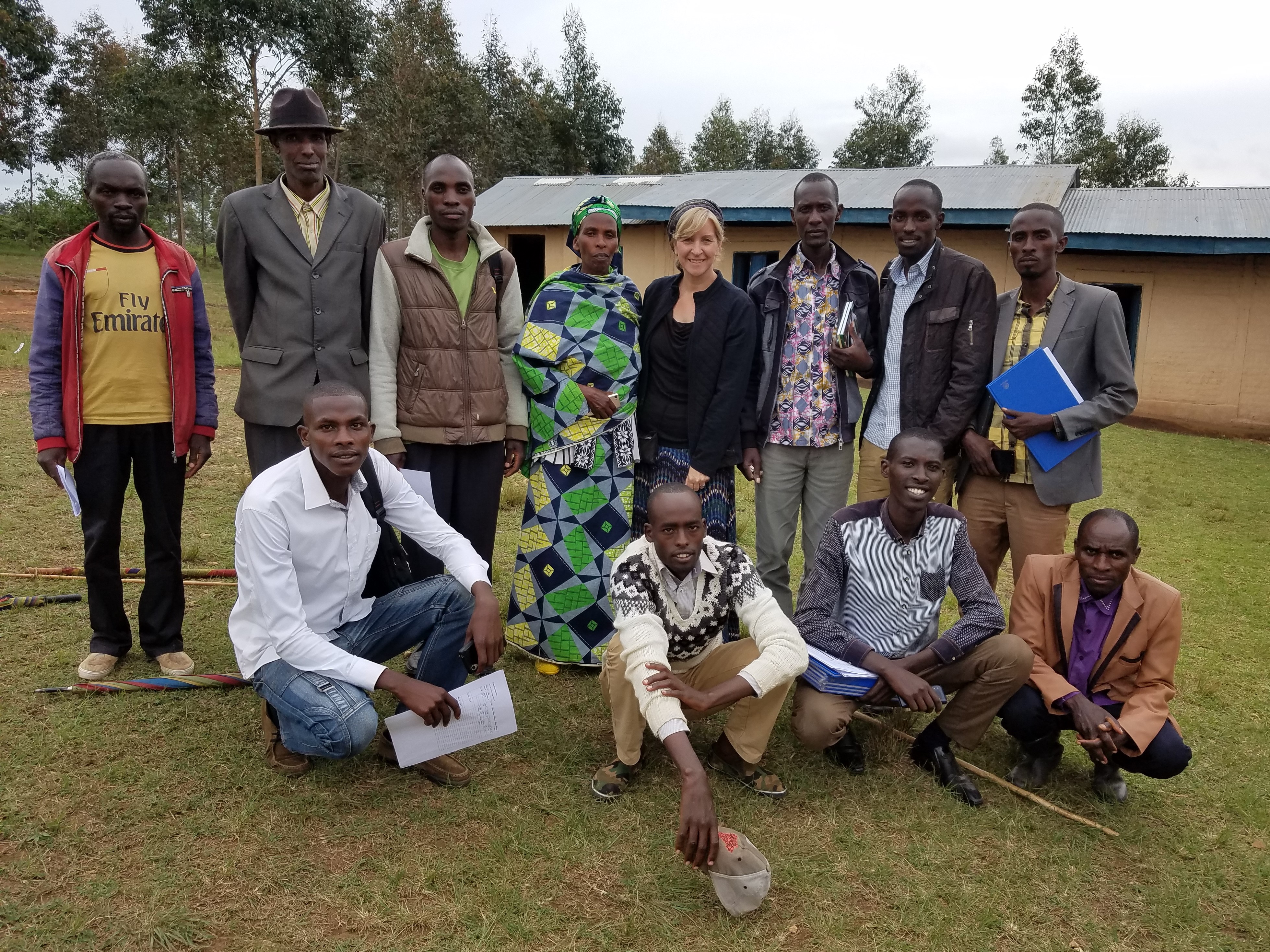
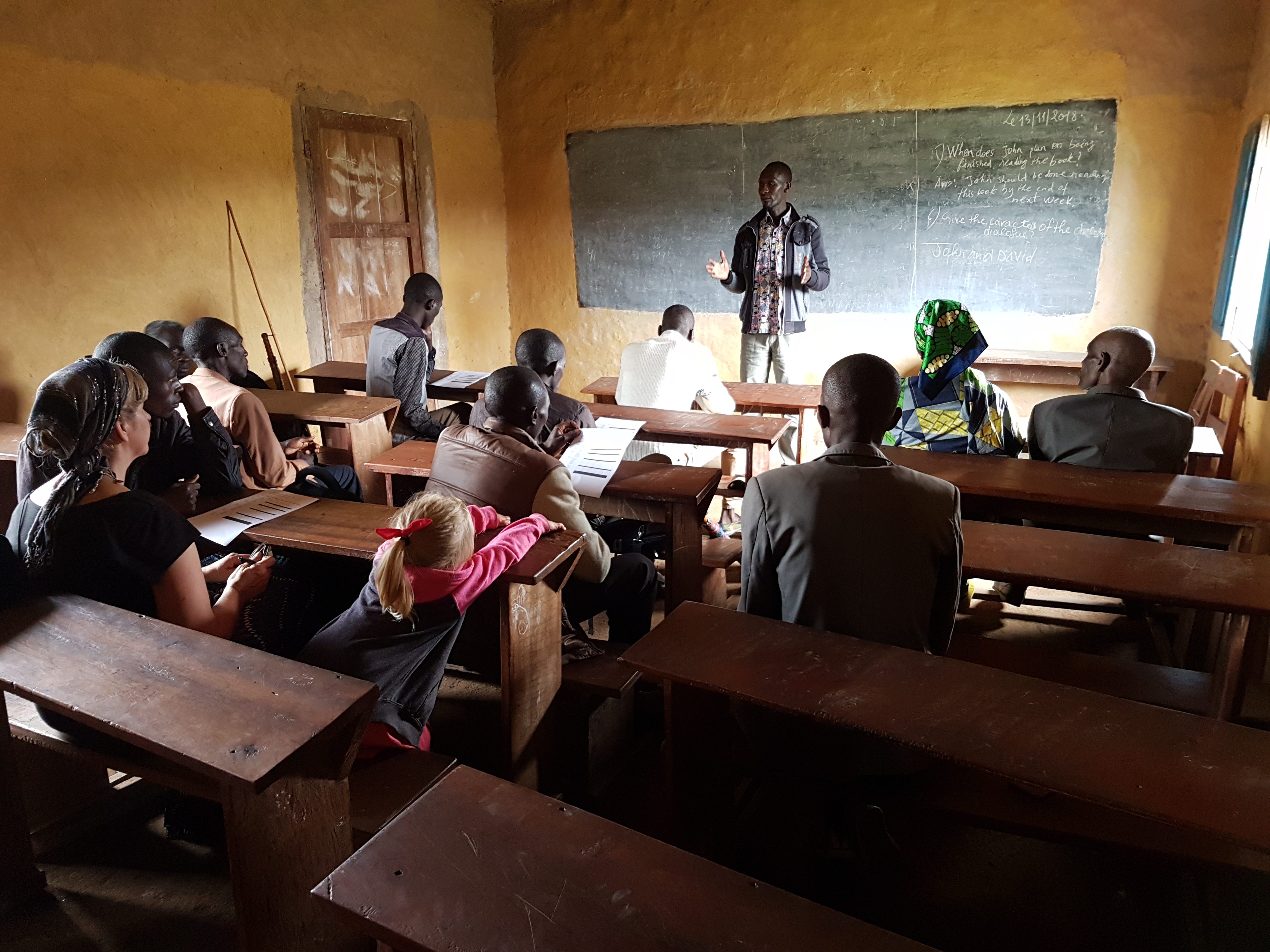
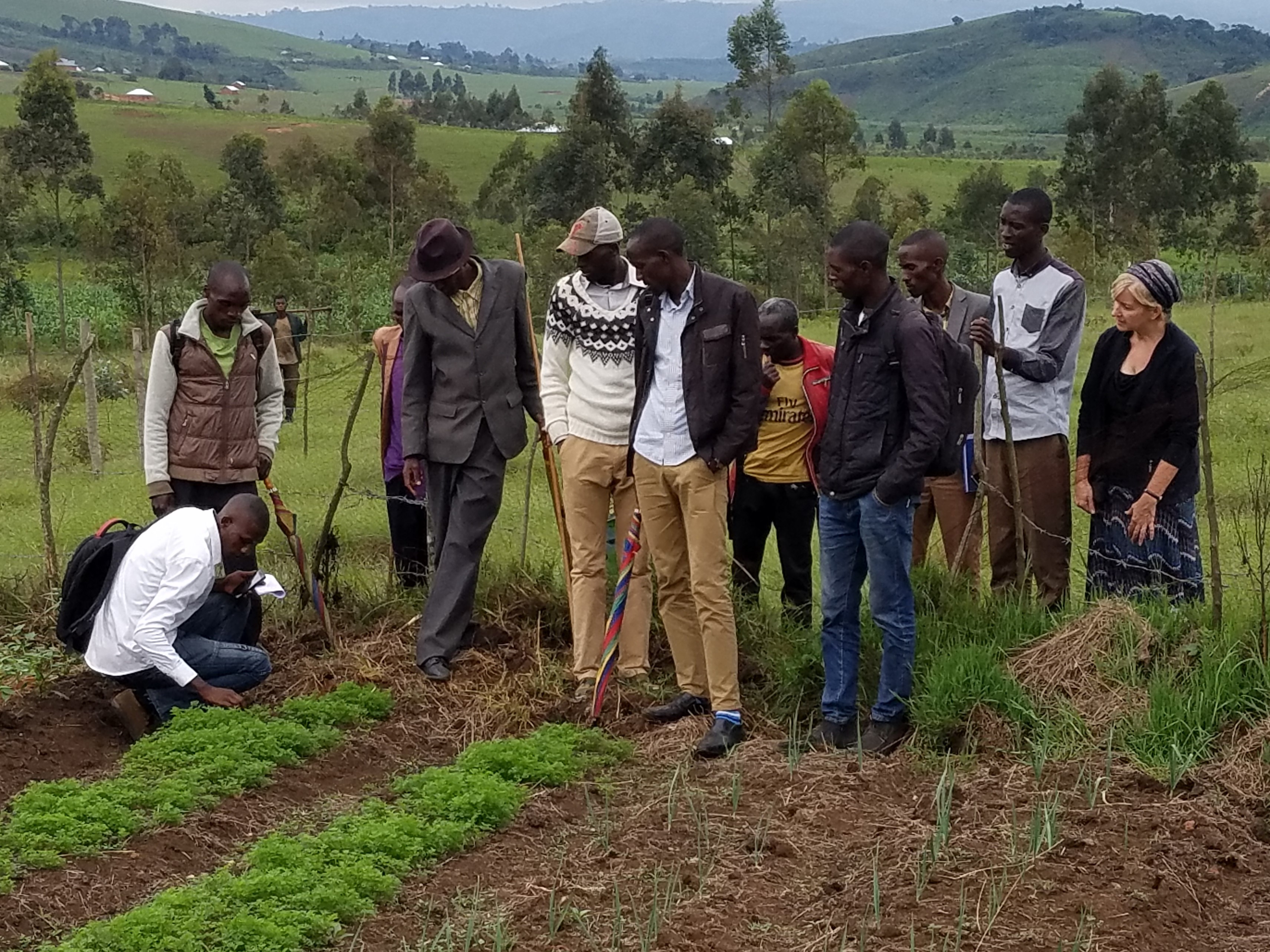
Three of the students took on the crop management of this huge project by using their own family’s land and in exchange we gave each of them a scholarship ($220) for that year’s tuition. We also got the local pastors and tribal chiefs involved to help us find some land in their villages that could be temporarily used by the refugees to transplant the nursery seedlings so the refugees could farm and produce food to feed their own families.
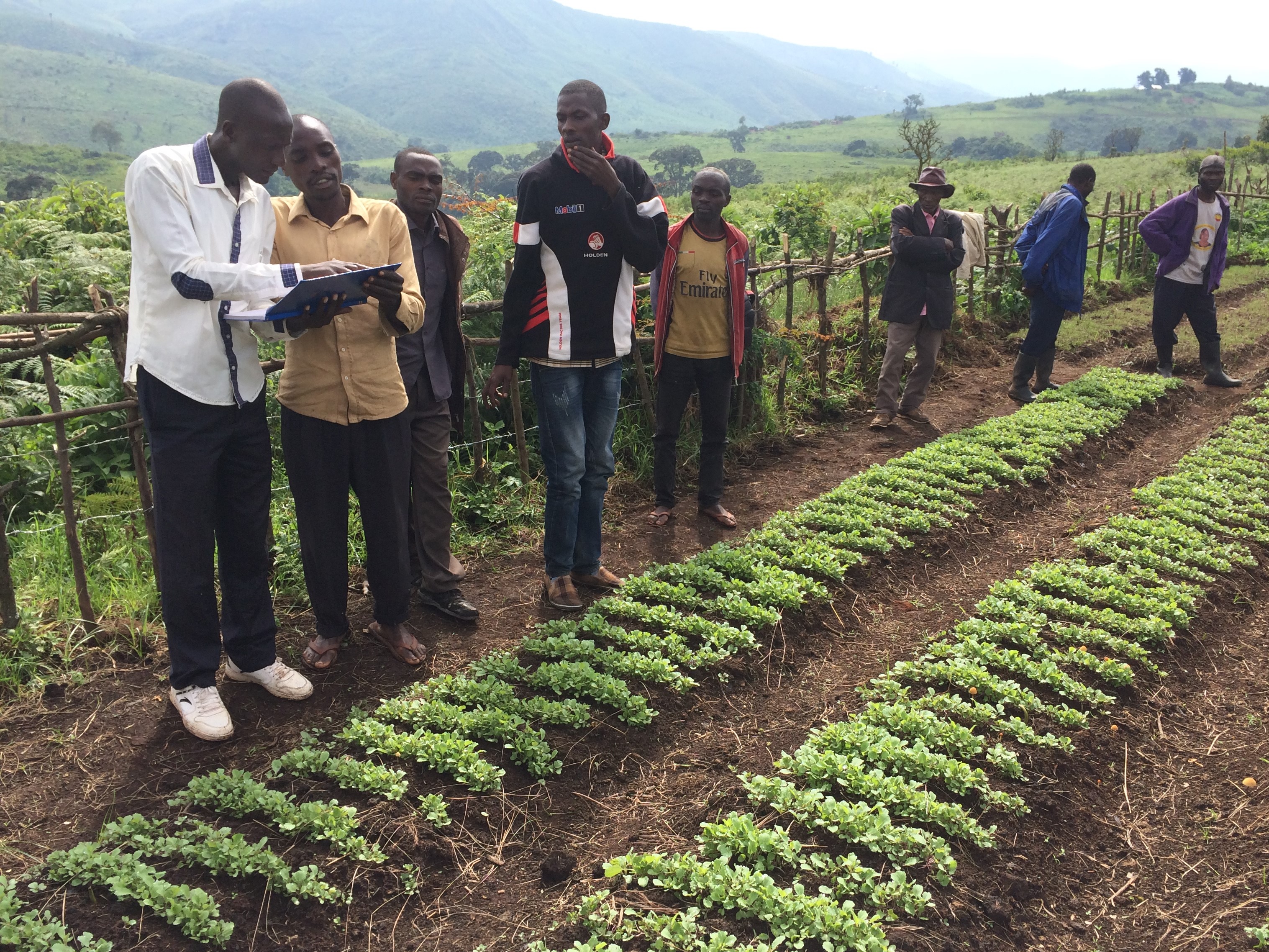
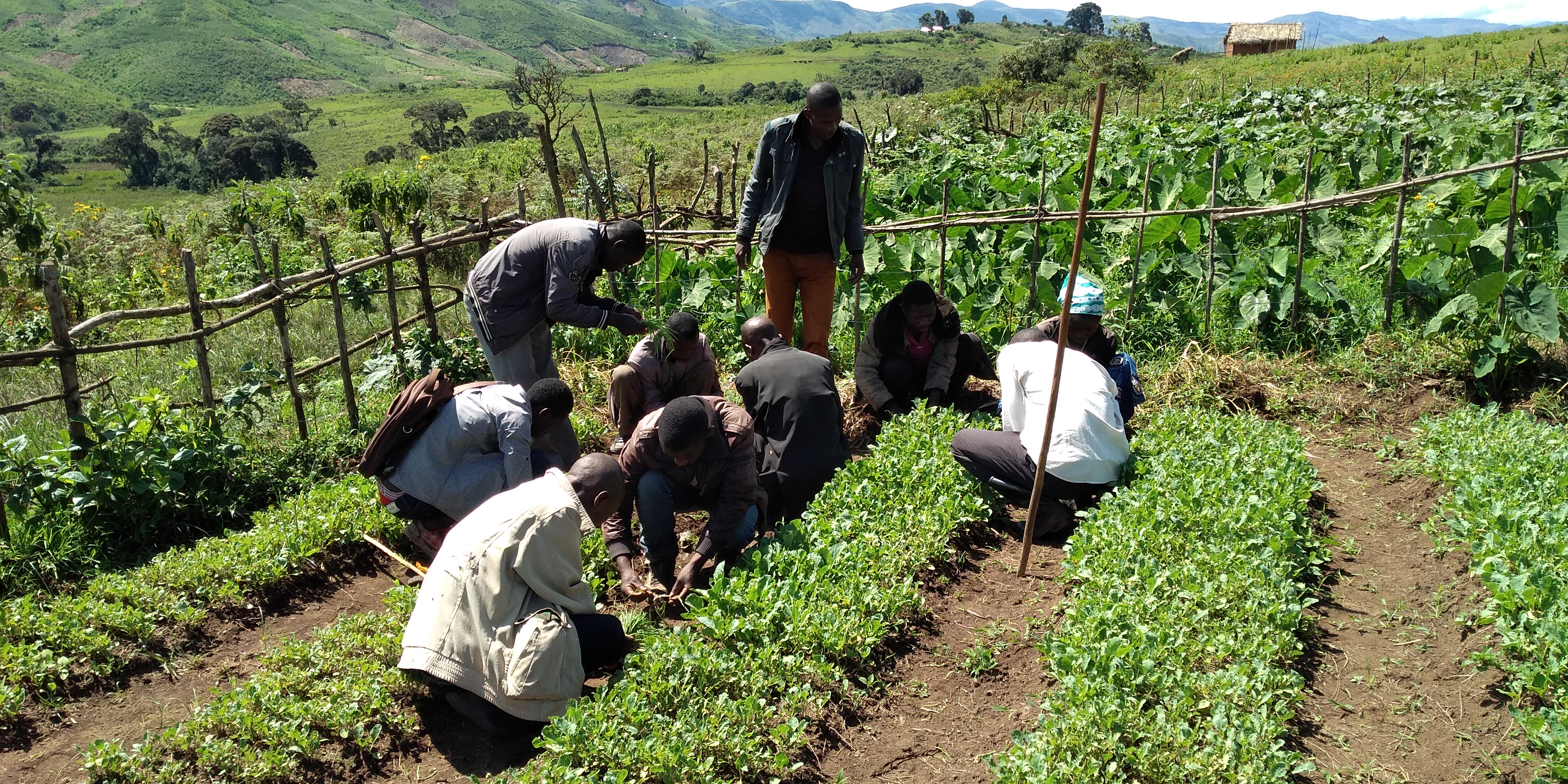
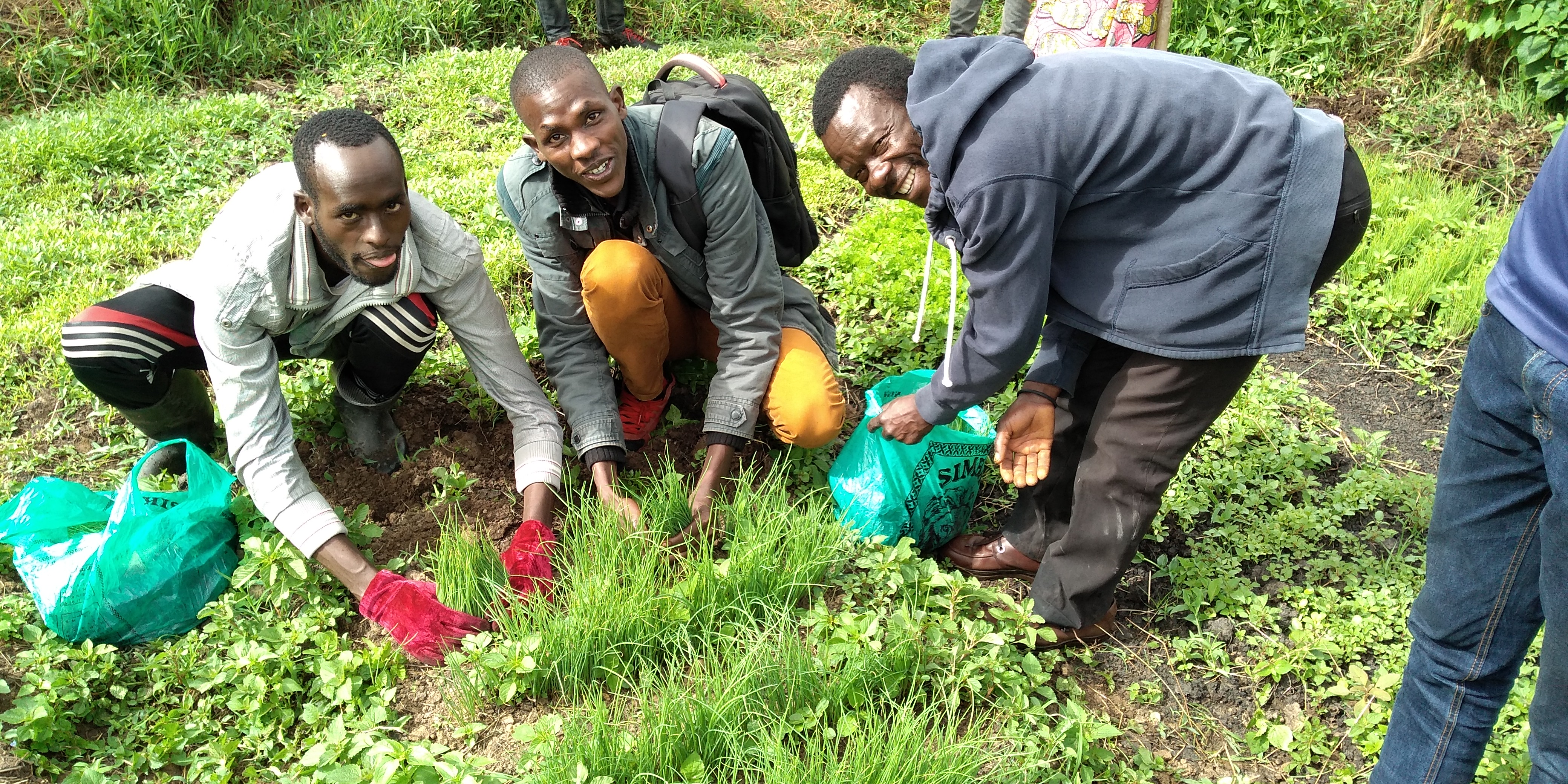
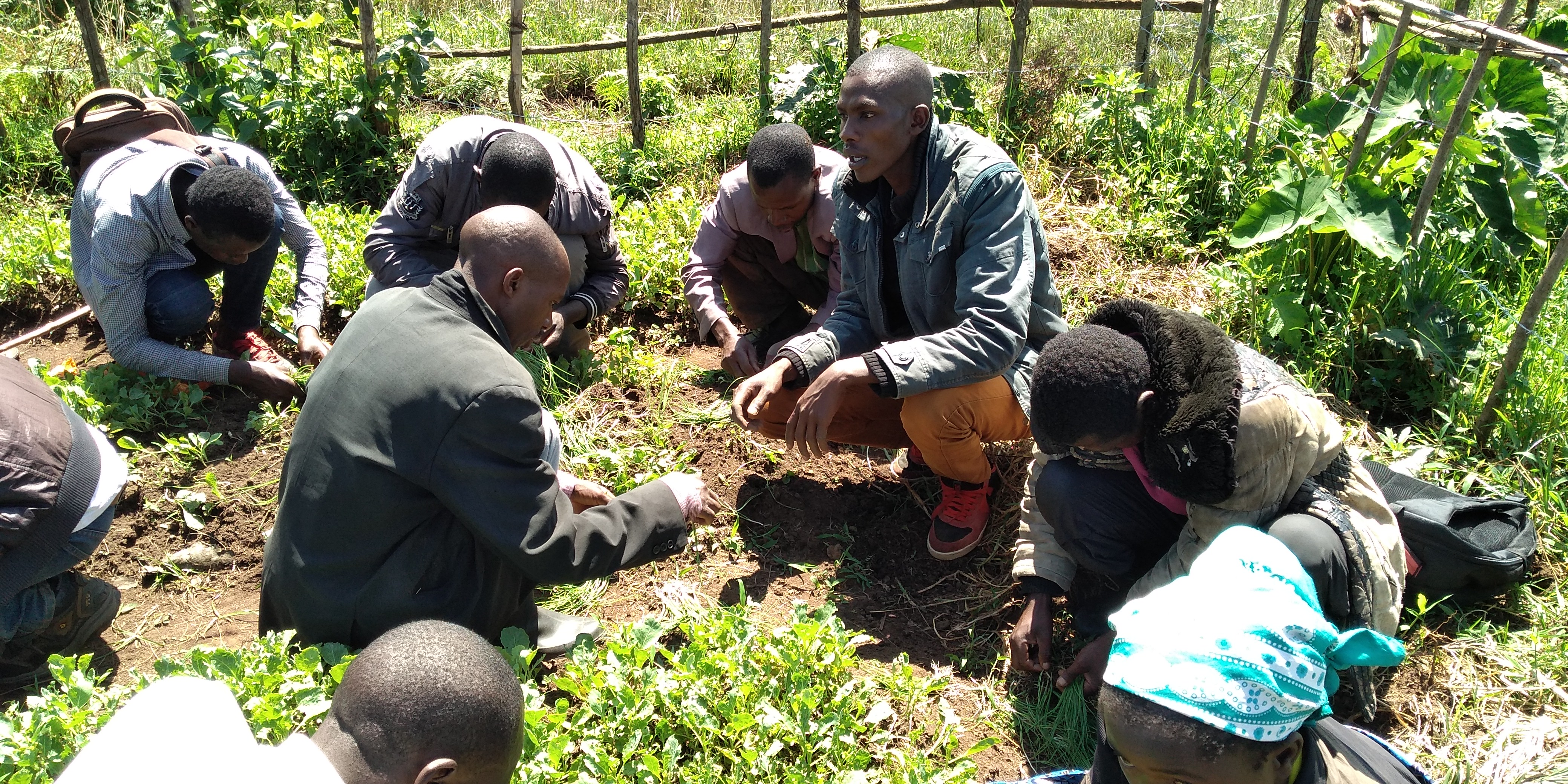
Each refugee family was also educated on farming techniques by the agricultural students and given a hoe since they had fled their homes with maybe only clothes and blankets before their villages were attacked and destroyed.
Overall, three thousand people were fed and cared for over six months and were greatly encouraged by the help given in such a time of need, and the university students gained valuable experience assisting with a crisis intervention program, as well as three of them receiving a year’s tuition paid. In the end, we were still able to assist the original 50+ families with seeds, nursery seedlings, and they were also given agricultural education to improve future crop production.
It all started with kids getting excited about a VBS project that was going to feed other kids and their families half a world away; it’s pretty awesome what the Lord did through the tender hearts of those kids and adults who gave. Here on the ground in the D.R. Congo, we were able to witness the LORD at work multiplying the generosity of His servants!
Lisa
Indy
We want to share with you dear friends and family that early last Wednesday morning, our precious little Indy (Ndishimiye), the youngest of the orphans, died of a stomach infection. The doctor was with Ndishimiye all night at the hospital and still didn't know exactly what he was dealing with; lab tests and medicine are so limited here.
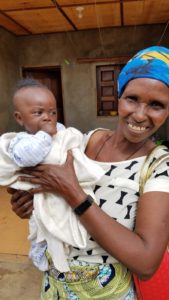
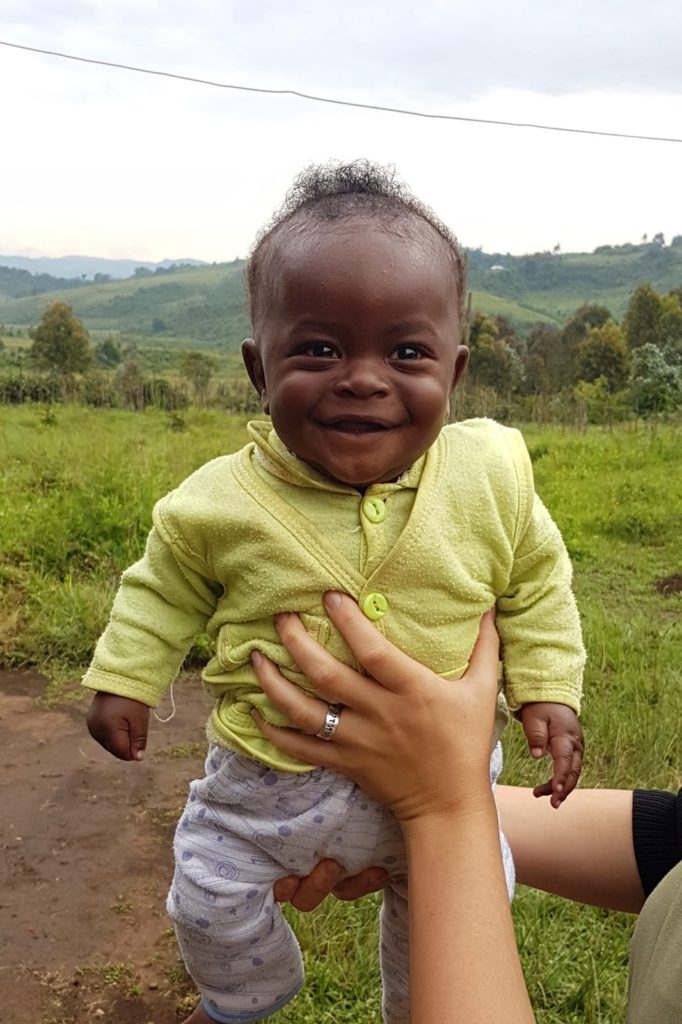
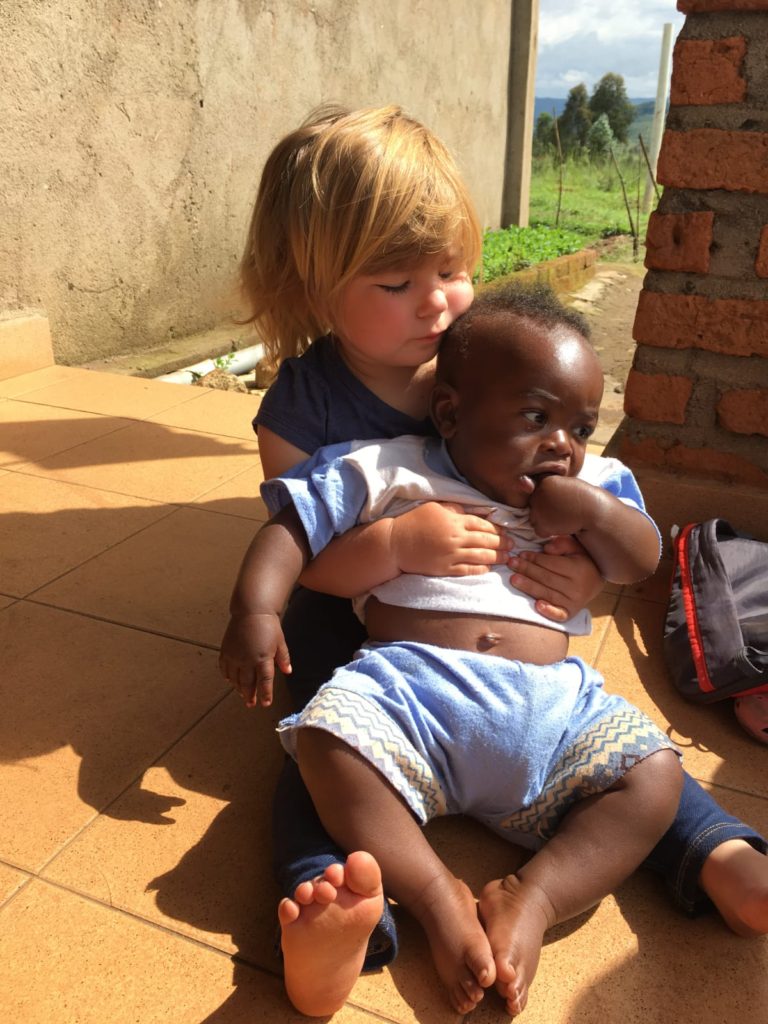
Our household is heavy and sad, as are Ndishimiye’s brothers and sisters. Joyeuse, the oldest (20) of the orphans, and another Nyota, (12 years old) were with Ndishimiye in a dark hospital room (no electricity there), holding him all night long and into the morning until his little body gave up the fight and he stopped breathing. Word was sent to us right away and Miles went to the hospital to confirm the message. Even a week later, I think we are all still in shock, especially anytime one of the other kids comes to visit, as they used to come to our house to get two bottles of formula from us three times a day. Ndishimiye had been to the hospital a half-dozen times before for stomach problems, but he had always been able to recover.
Indy's little body was carried back to the children's home; I watched as a of couple mommas carefully washed his body and dressed him in a well-worn but clean sweat outfit. The orphan boys asked me for $2 to buy wood, and in silence, and with so much love, they build a rough little box to put their beloved baby brother in, Some dear neighbors came, and a couple of pastors spoke sweet words about the Lord loving orphans. The other children sang two songs of worship to the Lord, most while fighting back tears.
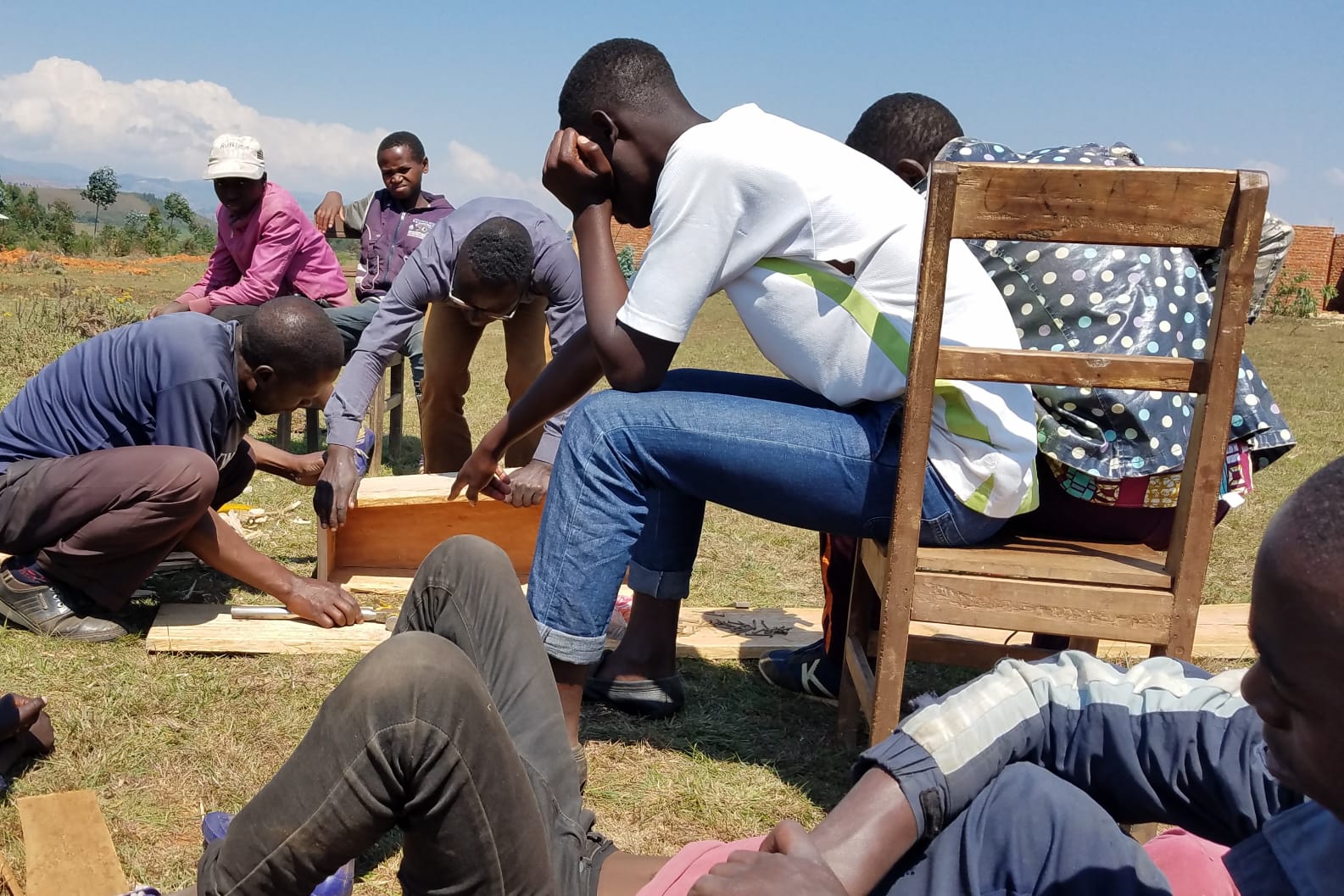
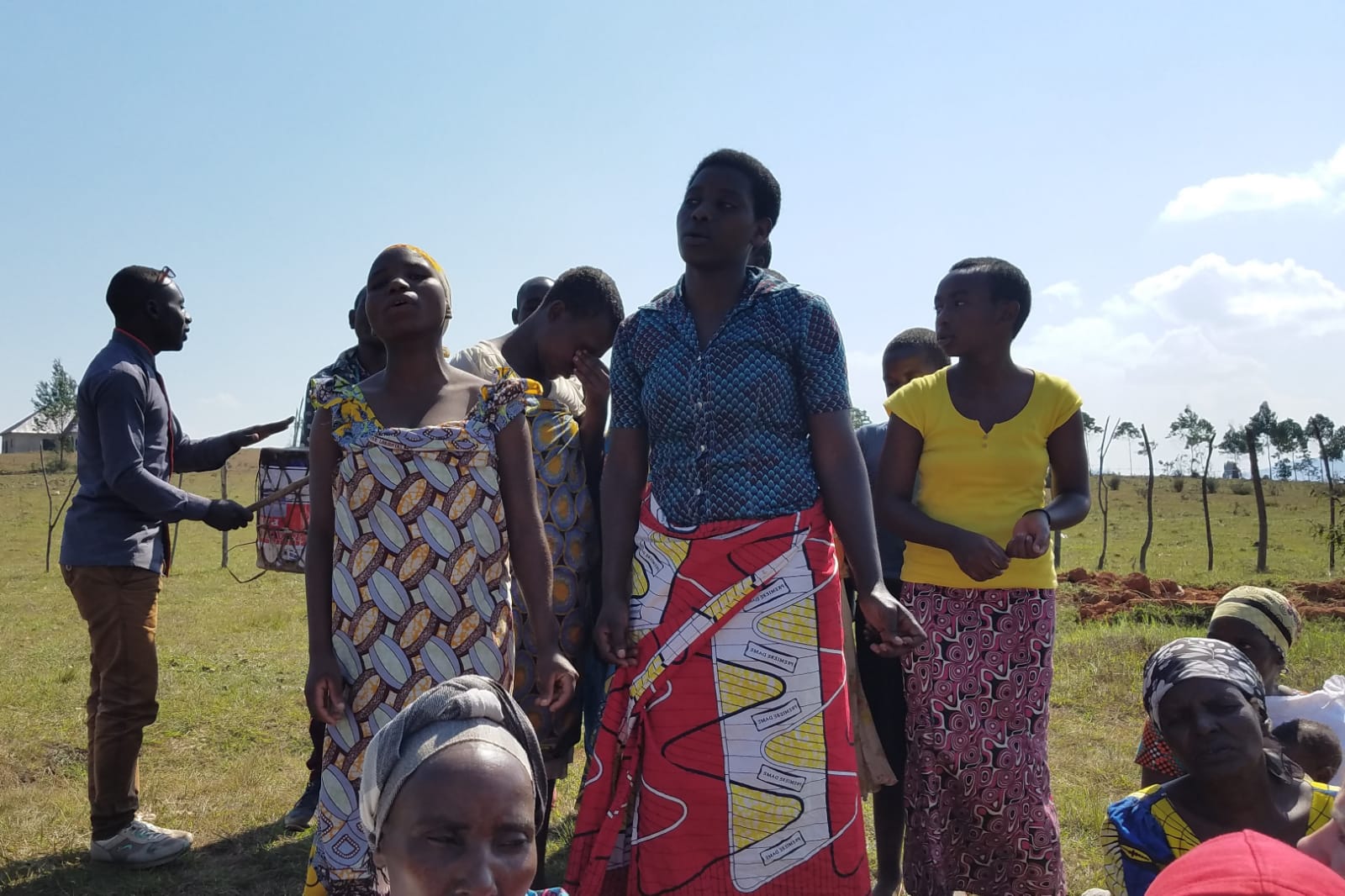
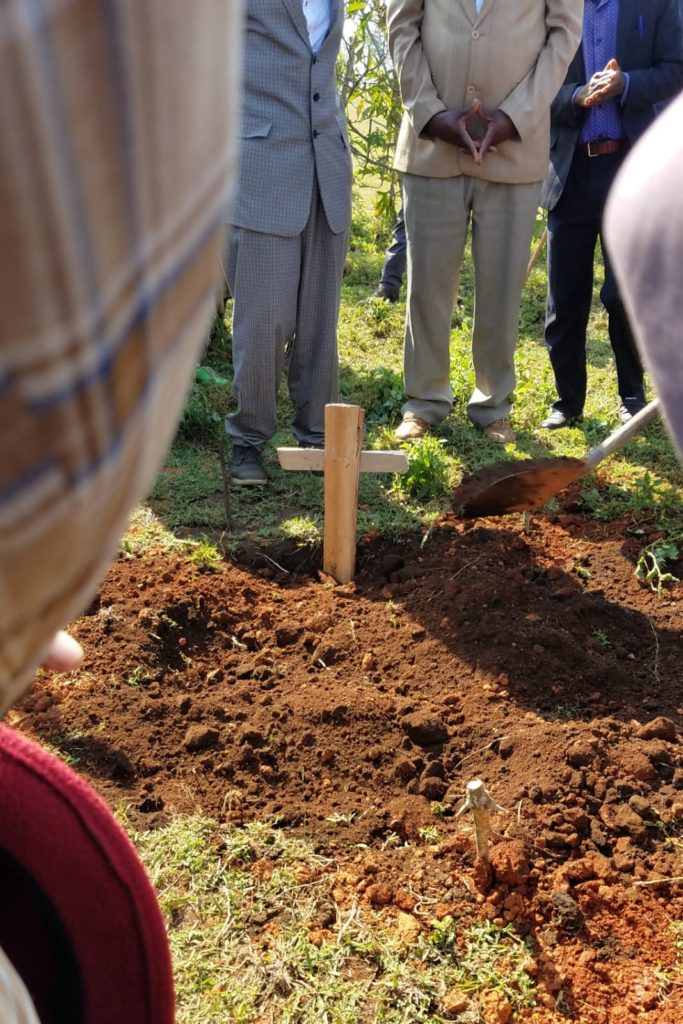
In the corner of the children's shamba (vegetable garden) a deep hole had been dug by the boys and some local men. We all walked the little box into the shamba; the pastor that had planted the first church here in our region spoke a few words about life, death, and trusting in the Lord. Dirt was shoveled over the little box and a small wooden cross made from the left-over scraps of wood for the casket was placed on top of the grave.
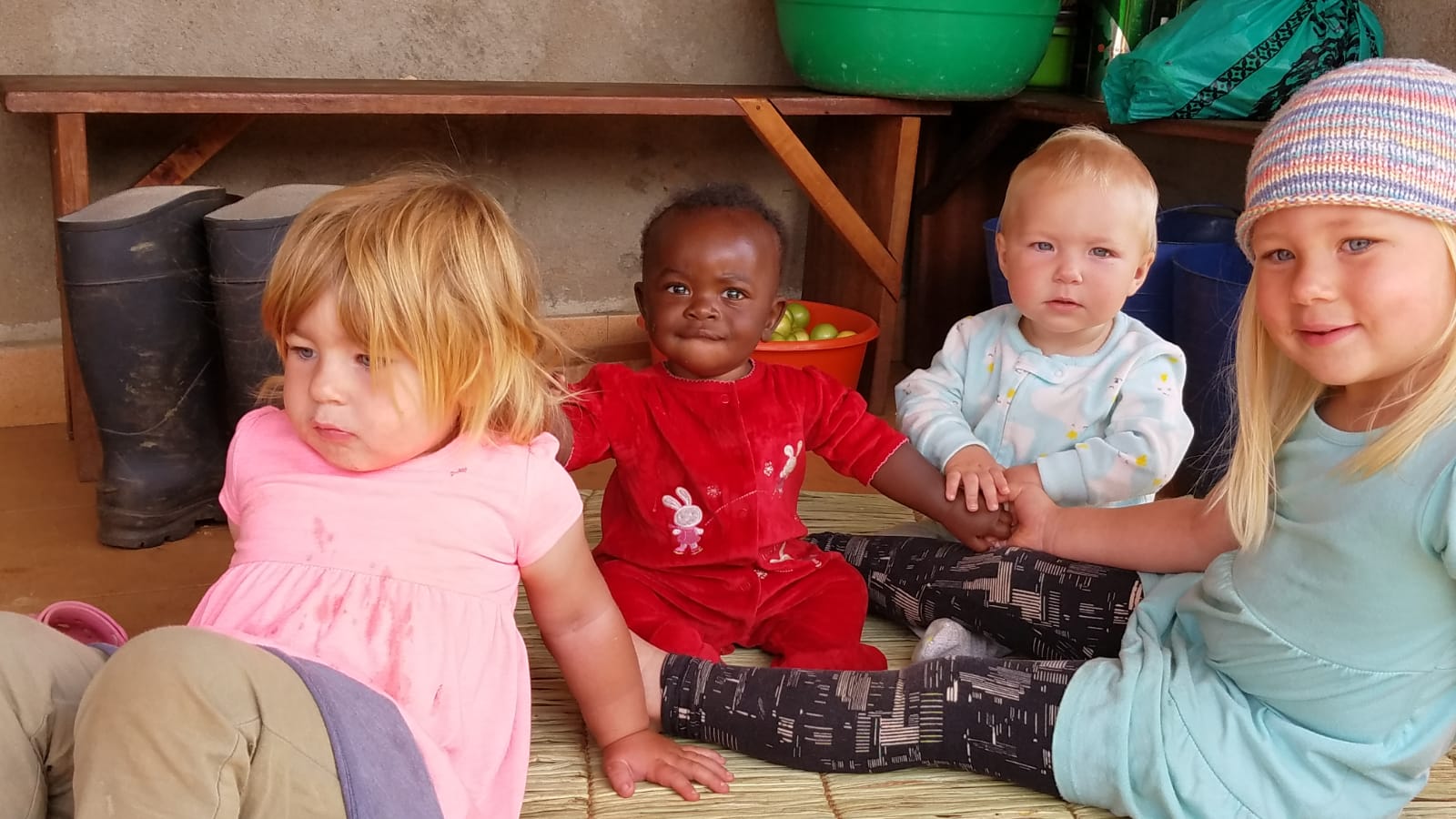
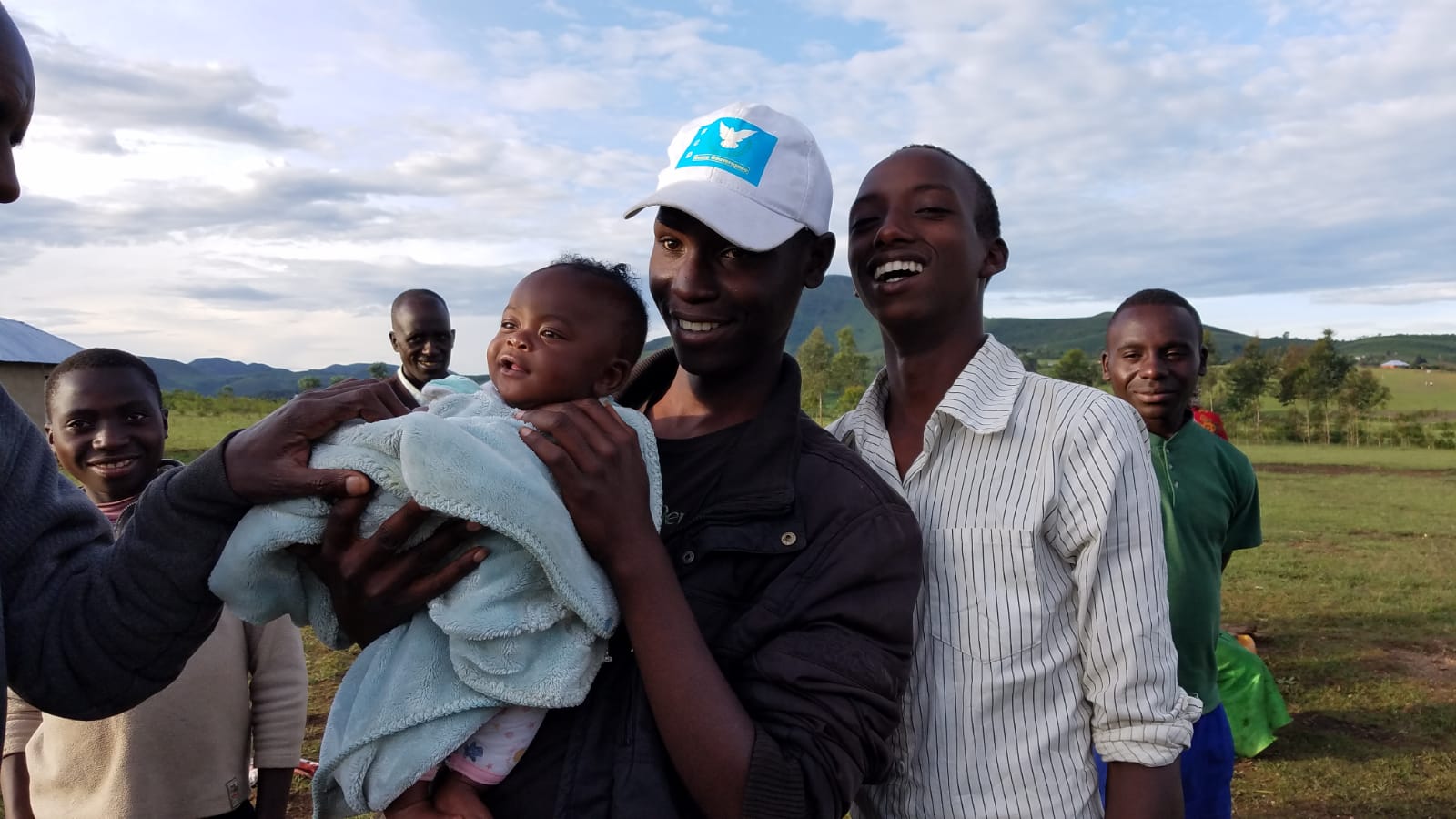
Little Ndishimiye... your name was given to you by the children who loved you. It's meaning holds true... "Praise the Lord" for our short year with you!
-Lisa
Rebels Again… and Again… and…
In the late afternoon of Wednesday, June 26, I dragged a bench out to the middle of the path in front of our gate and a couple of friends joined me.

We sat and listened to nearby automatic gunfire, greeted and encouraged fleeing neighbors, and waited to see if the rebels were heading our direction. We were also waiting on Miles and our co-worker Lazare.
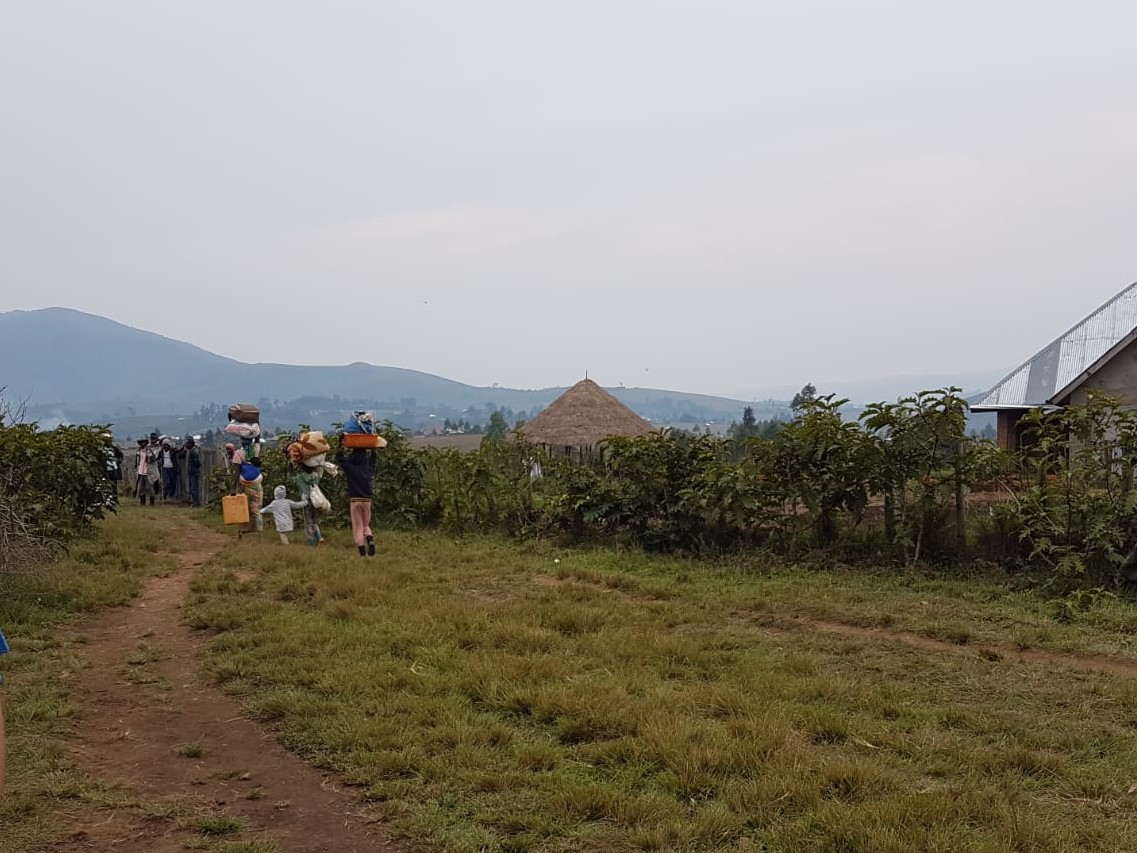
A lot of people gathered at our house that afternoon. The people in the photo who are standing are in front of our gate. The people in the foreground are fleeing; most went up the “mountain” in the background. That night we had an extra six people sleeping at our house, two of our staff and their children, as well as a group of six Americans who we were hosting from Tuesday until Thursday. In their own words, Wednesday was pretty frightening for the visiting group even though some had previously traveled to conflict areas, but none had ever experienced anything like this. They said the lack of a vehicle to flee in made a difference, but what especially got to them was seeing frightened people fleeing with their possessions on their heads and backs, and with a ton of kids in tow.

Were we happy in this photo? Not for the situation, but we were happy to be together. Behind us was the direction people were fleeing.
The fighting on Wednesday was miles south of us, but you could clearly hear the booms of the mortar fire. Automatic weapon gunfire began very nearby toward the very end of the day. We later found out that the cause of the gunfire was a drunk soldier who fired his gun, which in turn spooked other soldiers into thinking they were being attacked, so they fired their guns as well. The “gun battle” was intermittent but quite long. We had no idea at that moment, but without knowing I joked that it was a drunk soldier; sadly, soldiers here are frequently drunk. The worst part was the gunfire had separated all of us from Miles and Lazare, who had taken our motorcycle to visit with officials in “The Center.” The Center is our non-town town, kind of a shantytown that has grown up around the local government office and the UN base. Miles and Lazare were getting ready to ride our motorcycle straight into the path of the eventual random gunfire just as it erupted, but Miles was able to instead speed over to the UN base, where they took refuge until the shooting died down. Miles said he could hear bullets whizzing overhead a few times while they were at the base.
Things chilled on Thursday, then ramped up again on Friday in a village west of us. The huge Friday market broke up early as people hurried back to their homes to grab their children and belongings to then flee once again. Friday’s attack was a surprise to the inhabitants of that village; two brothers that work with us had to run home to help evacuate their brothers and sisters after their dad called them. This village is one that Miles and I have visited often as we work there with a teacher who runs an afterschool program for high school students; Miles was going to teach a Basic Electricity course there this summer. The village is five miles away from us, or about a 15-minute motorcycle ride on a really bad path.
Rebels had been attacking different villages every few days, and in-between people would hear rumors of rebel attacks, so there’s been a lot of movement of people fleeing back and forth. The army flew in maybe 15 plane loads of soldiers on Saturday, and more planes came in on Sunday but we’re not sure if those planes had soldiers or just supplies. We met many of the MSF (Médecins Sans Frontieres\Doctors Without Borders) staff that came to help as there have been plenty of shot up rebels, soldiers, as well as locals who have tried to fight off the rebels. If we were to guess, we would think that maybe another 150-200 soldiers arrived on Saturday, which is not so many considering that the bad guys attack each village with double that amount, and a significant amount of soldiers are needed to keep “The Center” and the "airport" secure.
Some background on why things are such a mess here. Beginning with the original outbreak of violence that eventually pushed Miles and family out of the house and onto the UN base back in May, it seems that a commander who was leading the army was actually working with the rebels, giving away supplies and ammunition, as well as vital info such a troop movements. Plus... there was an insider within the UN (most likely an African in a supporting role) that was helping get information to the rebels, and/or keeping information away from the UN. We do not know if anyone is actually in custody. The army commander went to the UN base and asked for sanctuary because he feared for his life once he was discovered as a traitor. This was all discovered around that fateful Wednesday, so this is likely one reason the rebels’ attacks were not more easily repelled. A new commander of the army was put in place as of Wednesday, but he has an uphill battle on his hands in overcoming the advantage given to the rebels due to the help of the traitors. Why did those guys, as well as another I can’t mention, do what they did? It could be politics or tribalism, but most likely money, as none of them make much, nor are they paid with any regularity.
We’re not going anywhere at this moment unless we hear or see that the bad guys are breathing down our necks, but we do have small bags packed and planned escape routes. Emilee says she is much better packed this time around. We feel safe and secure, and we’re surrounded and blessed with many friends here. We are also in good relationship with the local government officials, as well as the leadership of the UN Peacekeeping force, all of whom are sincerely interested in our wellbeing. Communication is sketchy at best, but we will do our best to keep you abreast of this situation, and we’ll try to finally post some of the numerous positive activities that are happening day in and day out here in Minembwe. Many thanks for your continued prayers!
Somehow!
Michael
"Maybe Tomorrow"
“Maybe tomorrow” … we hear this a lot in the DRC.
While Lisa and I (Michael) were in the U.S., various militias went on a weeklong rampage in Minembwe. The Ostranders and others heard about village after village being abandoned, then overrun, and, most of the time, burnt to the ground. Within a few days, the O’s could see the smoke and fires, and they were eventually encouraged to seek shelter at the local UN base that is only 1.5 miles from where we live. The O’s were treated exceptionally well during their time spent at the base.
After eight days of hearing “maybe tomorrow” from the UN, the O’s were finally able to get a helicopter ride from Minembwe down to the UN base in Uvira. From there, the O’s were able to get a ride across the border to Bujumbura, Burundi, where they have been for nearly two weeks.
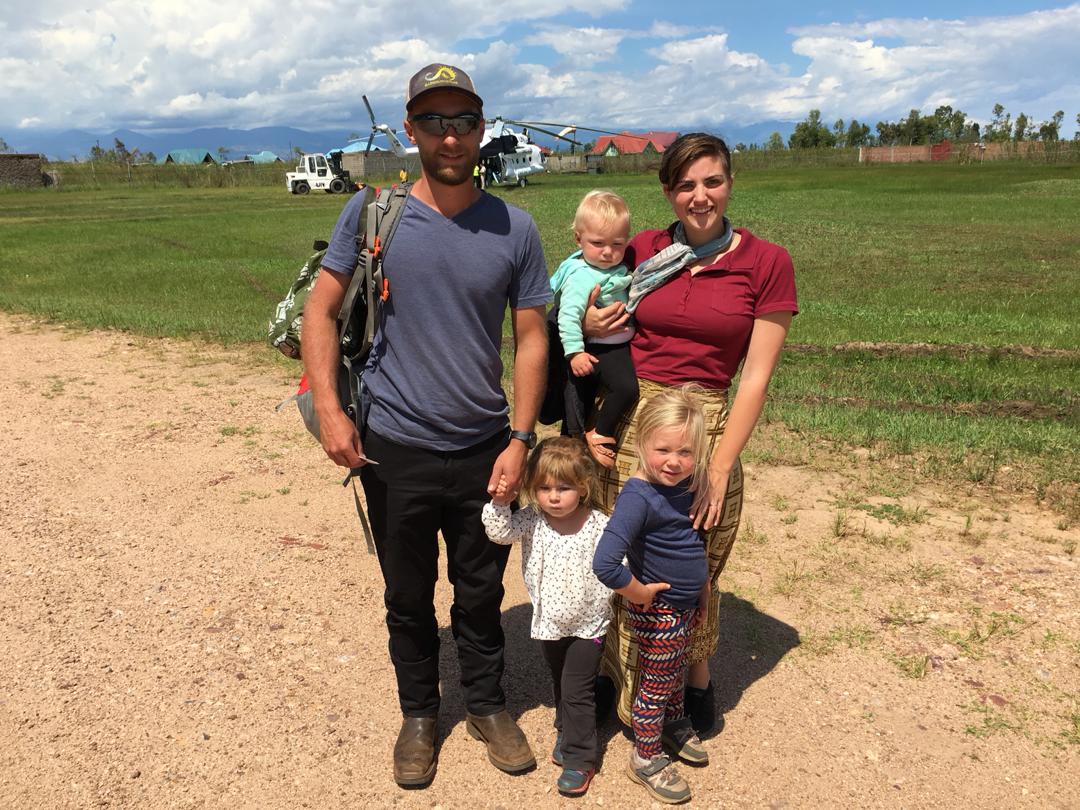
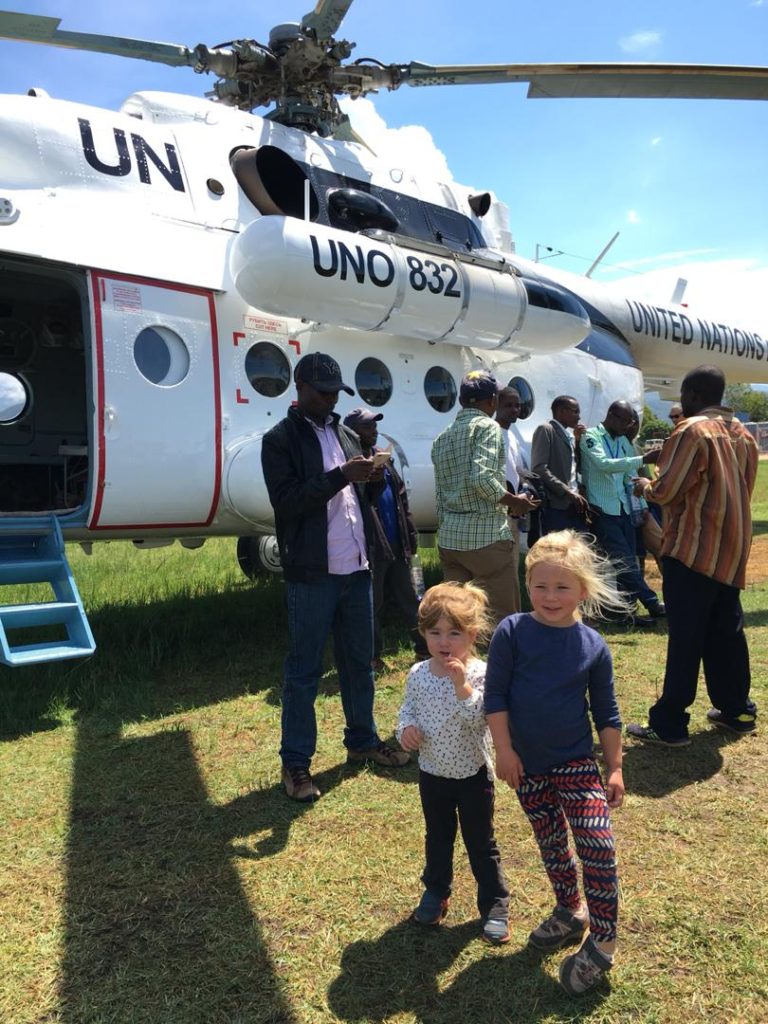
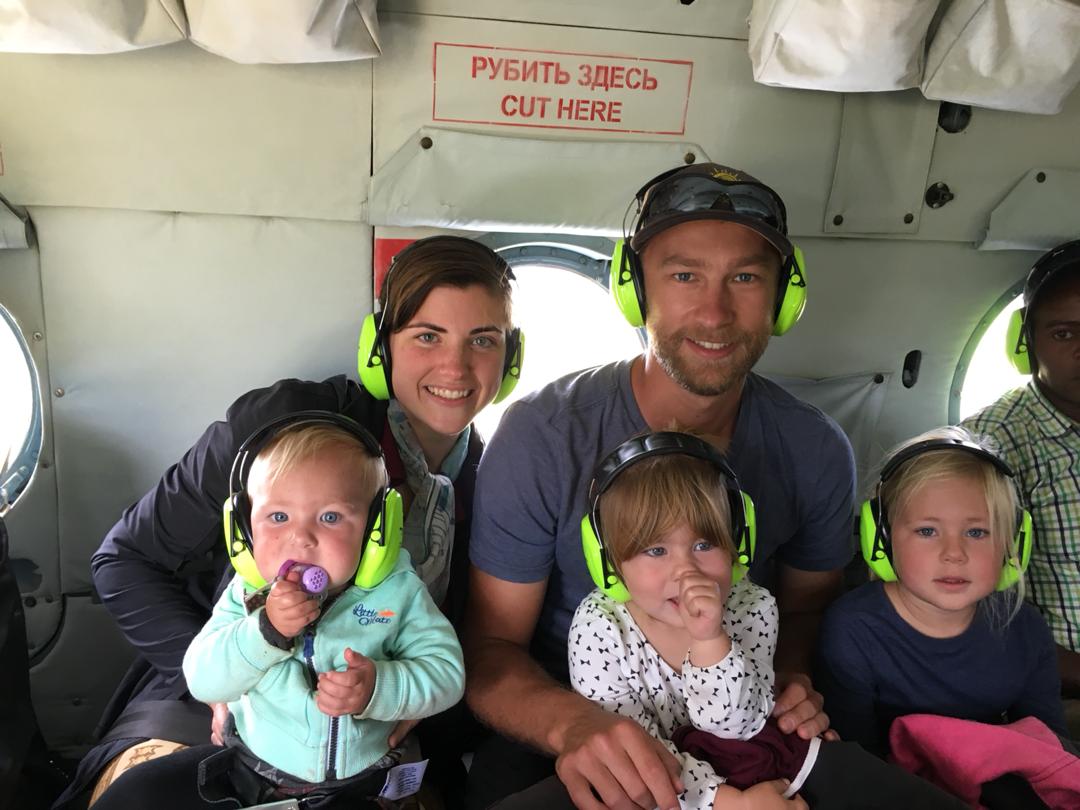
Even before the O’s left Minembwe, things had started to calm in the area where we live, but those we work with, as well as the U.S. Embassy preferred that the O’s “get out of Dodge” for a while until things became more stable.
Three days later, Lisa and I flew into Goma, and after a 10-hour road trip via the winding roads of Rwanda and Burundi, we arrived in Bujumbura the next day to join forces with the O’s.
Now, all of us are trying to make our way back up to Minembwe. This past Thursday, Miles had the necessary paperwork to get a ride up to Minembwe via the UN helicopter, but he was turned away due to an overbooked (by more than double) flight. I have paperwork to go via the helicopter on Monday, so the latest plan is for me to try to get up to Minembwe and assess the situation, and then give the okay for the rest of our family to come up to Minembwe via a plane this week.
So once again… maybe tomorrow.
I see fire... fire and smoke.
Everything has changed so many times that we have put off sending this out.
On Thursday or Friday morning, 30-40 kilometers to the east of us, a “Maimai” (rebel) group started attacking outlying villages in retribution for a rebel leader who was killed by the main local tribal group we work with. I’m sure we will hear many different stories before it’s all done. By Friday night, we could see the fires and smoke of homes on the distant hills.
Things calmed down Saturday and Sunday, and people, including the UN, believed that the rebels had been pushed over 50km away and were retreating.
However, Monday morning, we woke up to distant gunshots and saw smoke from a village 10 km away... then from another... and from another. Still about a two hour plus walk away. We got so many different stories that Miles went to get a better look, as close as he safety could, and to talk to those fleeing. Three villages to the east of us were burned, but there was only one known casualty.
Late Monday afternoon, Miles and Bella went to greet the UN helicopter that arrived and they met the new Pakistani UN Major who will now be in charge of the UN troops in our area. He promptly fell in love with Bella. On Miles’ way home, he saw fires in a village about one hour’s walk to the north. So, we decided to head out immediately to the UN base with the girls. Miles went back to get our bags and a few more things from our house (like toilet paper and sleeping bags and even more diapers). All that to say, our family is currently safe and well cared for (Pakistani food and hospitality is amazing)!
There is a constant stream of people from the villages that are being attacked coming into the “center” area of Minembwe, where the UN base is, as well as a constant flow of people returning to the villages that were burned or the surrounding villages.
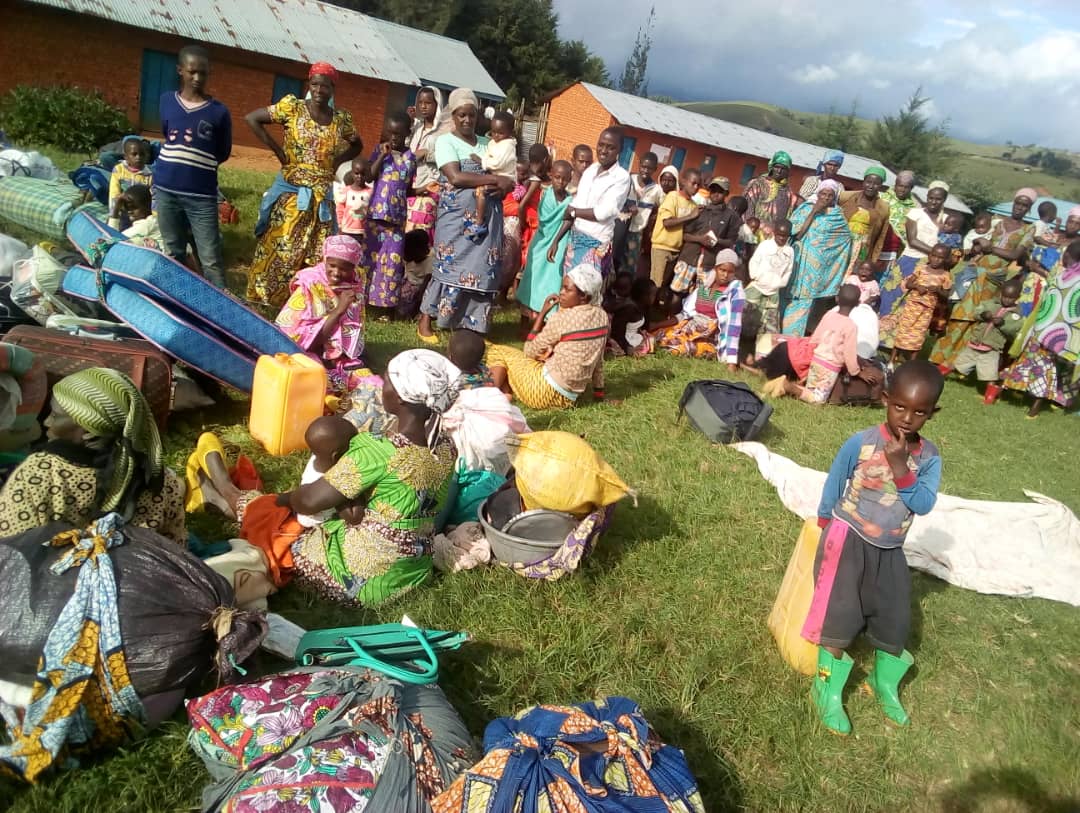
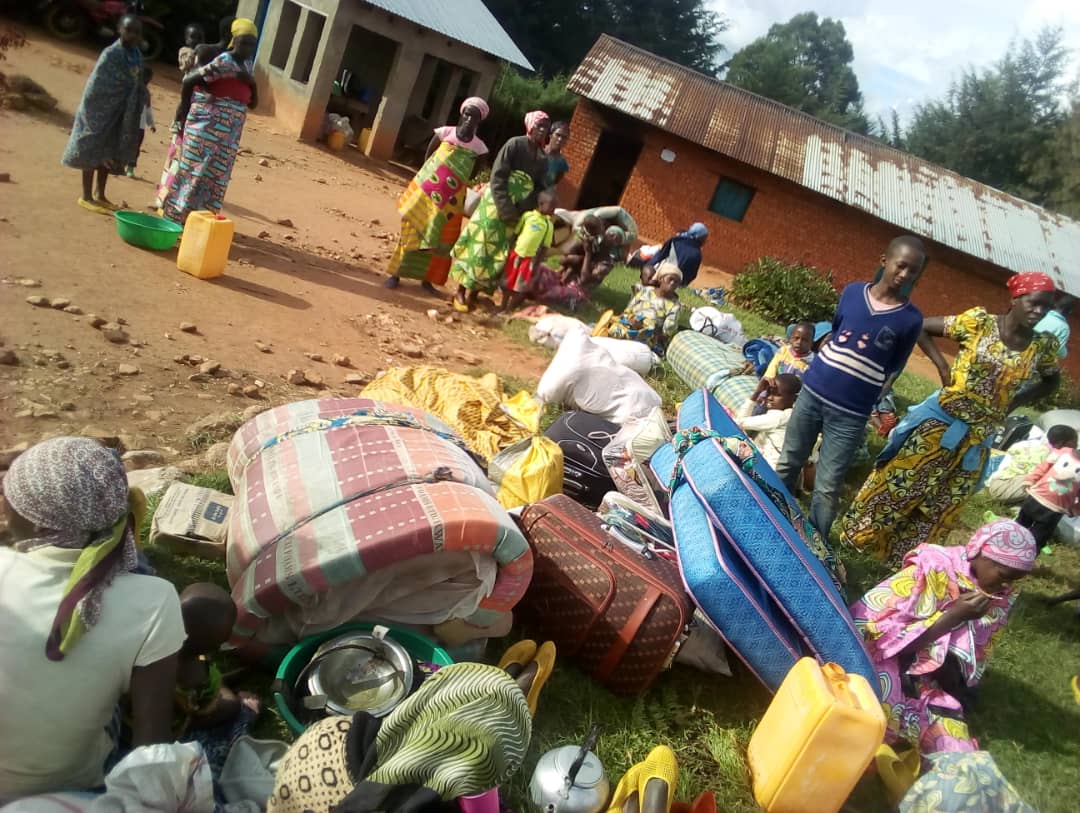
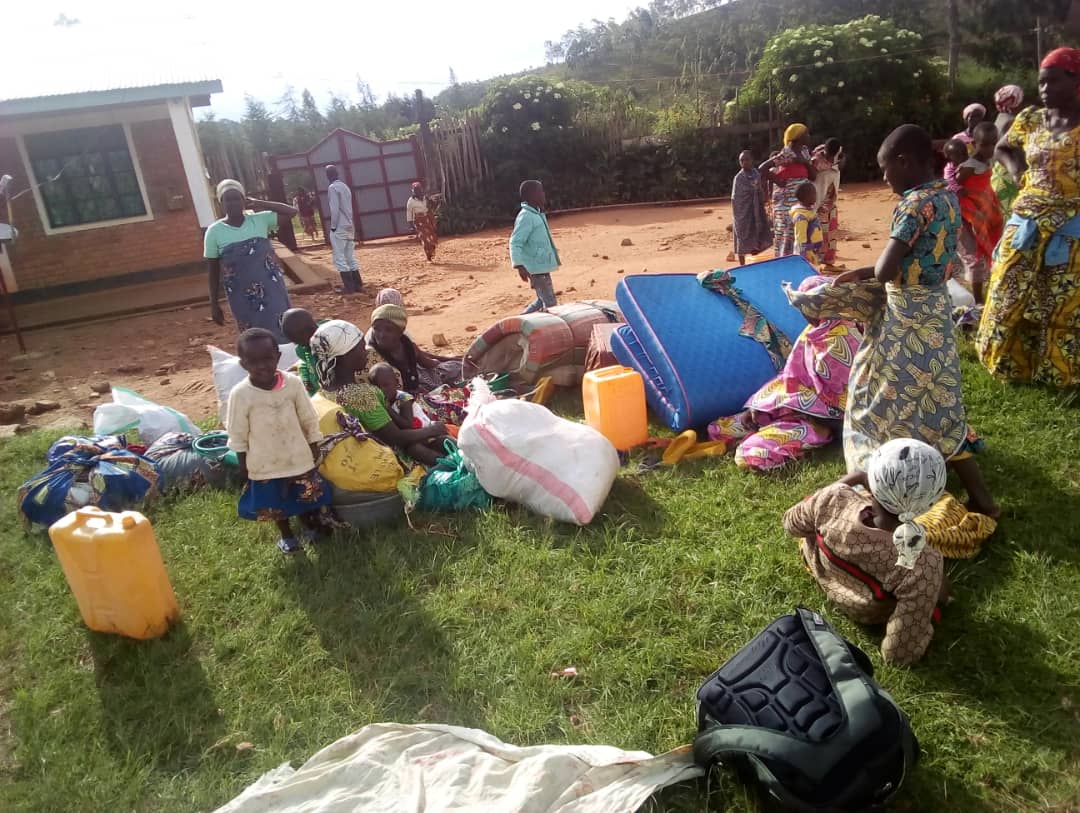
Tuesday morning, villages to the south were burned, followed by villages to the west. The most recent news is the village of one of our closest friends has been burned; he and his family have lost their homes. In our village (Kaziba) a few homes were lost on the outskirts. Please pray for our close friend Namajana’s home which is also on the edge of the village.
It’s very strange that there has been almost no loss of life (maybe one person and a couple injured). This time it seems the rebels are just interested in burning and running. We are told there are two rebel groups from two tribes and they are burning the houses of innocent people of the opposite tribe in retaliation of each other. We were told tonight that one of the groups has been chased to the north and another is being pushed back in the south. Between the two groups, the destruction has completely encircled our area.
We are waiting to hear if and when we can get out of Minembwe on the UN helicopter, but if not, there are usually airplane flights out on Thursdays and Saturdays. We hope to get down the mountain for a short while until it is safe for the girls to return.
Quick personal update. We have our workshop’s foundation done and are 230 bricks short of the needed 3000! If things had been calm we would have started building it today. After the shop is done and we have a place to store things, Lord willing we will start on our house.
I wish we had happier news to send. Please continue praying for the families of Minembwe.
With Love,
Emilee, Miles, Bella, Sophia, and Aimee
Got… hand sanitizer?
Back in October, working with the Perinatal Rescue Network (PRN), two midwives led trainings here in Minembwe focused on immediate post-birth care for newborns and the mothers (read about that here). The lasting impact of these trainings have already been lifesaving. Due to transportation issues, some of the supplies (including infant respirator equipment) that the midwives had brought remained “down-mountain” until three months later when everything finally arrived and we were able to deliver these items to the local hospital and university.
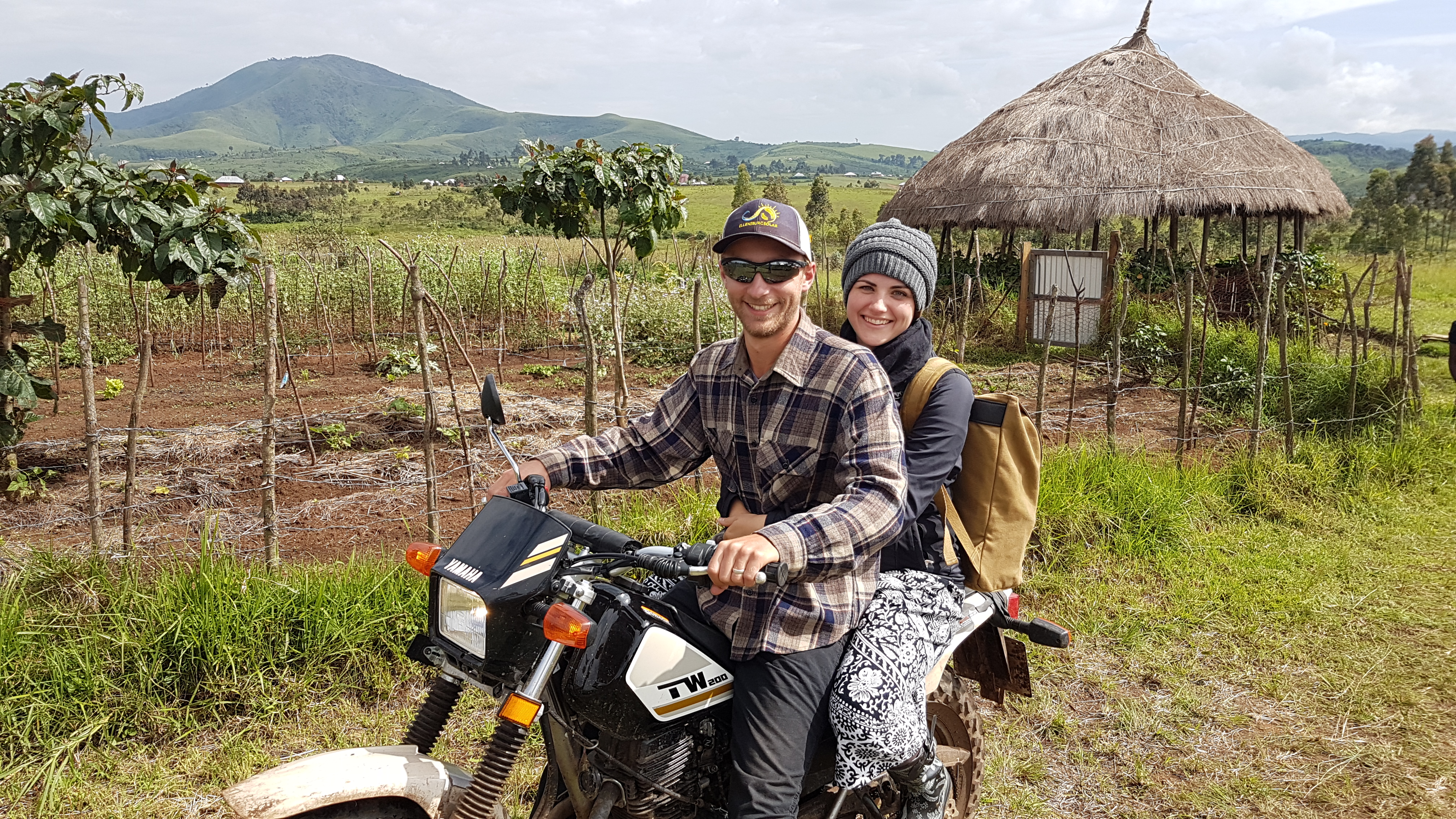
Along with one of the hospital’s doctors, Miles and I (Emilee), were able to bring these promised supplies and equipment to five different clinics around the region.
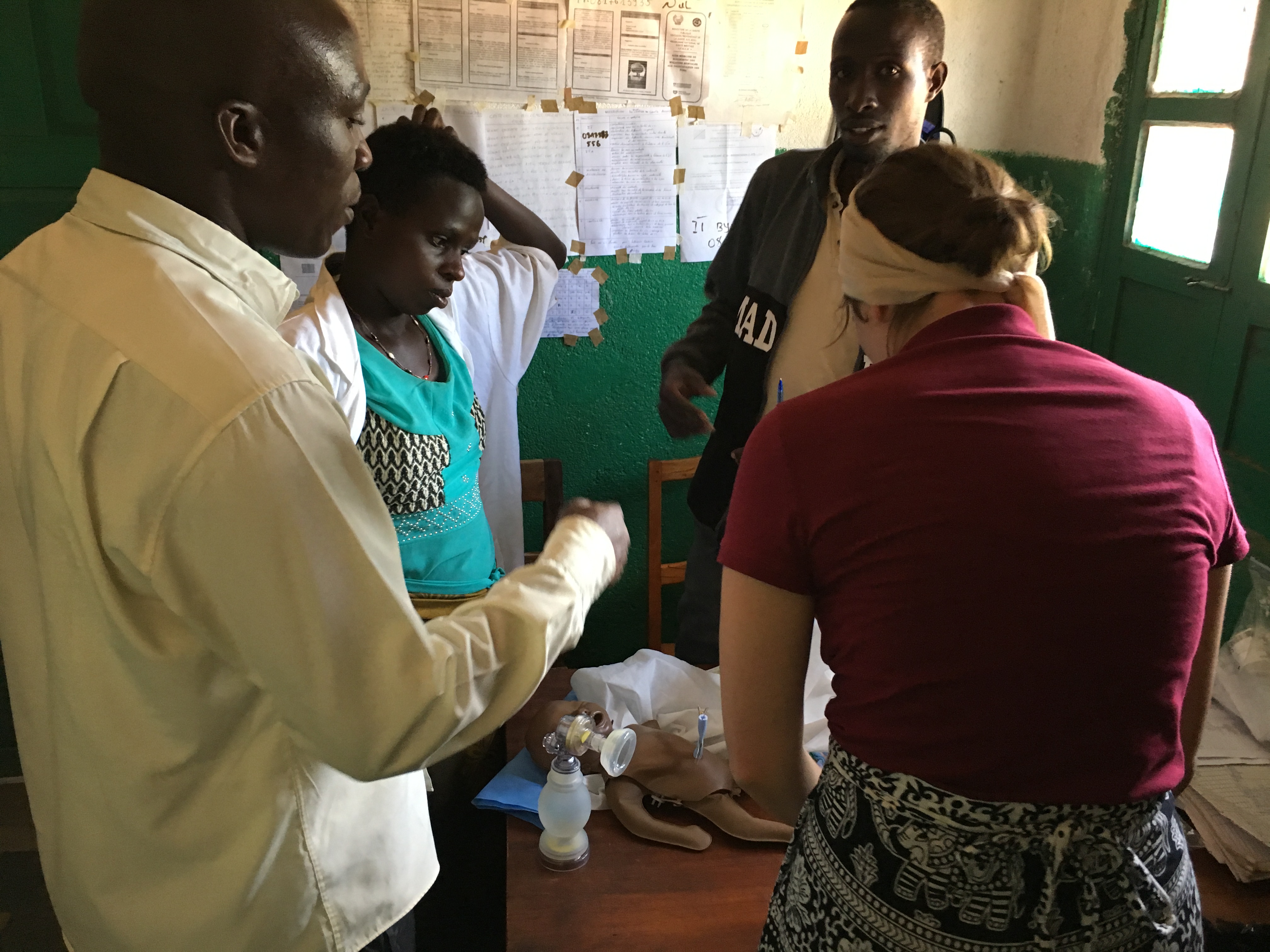
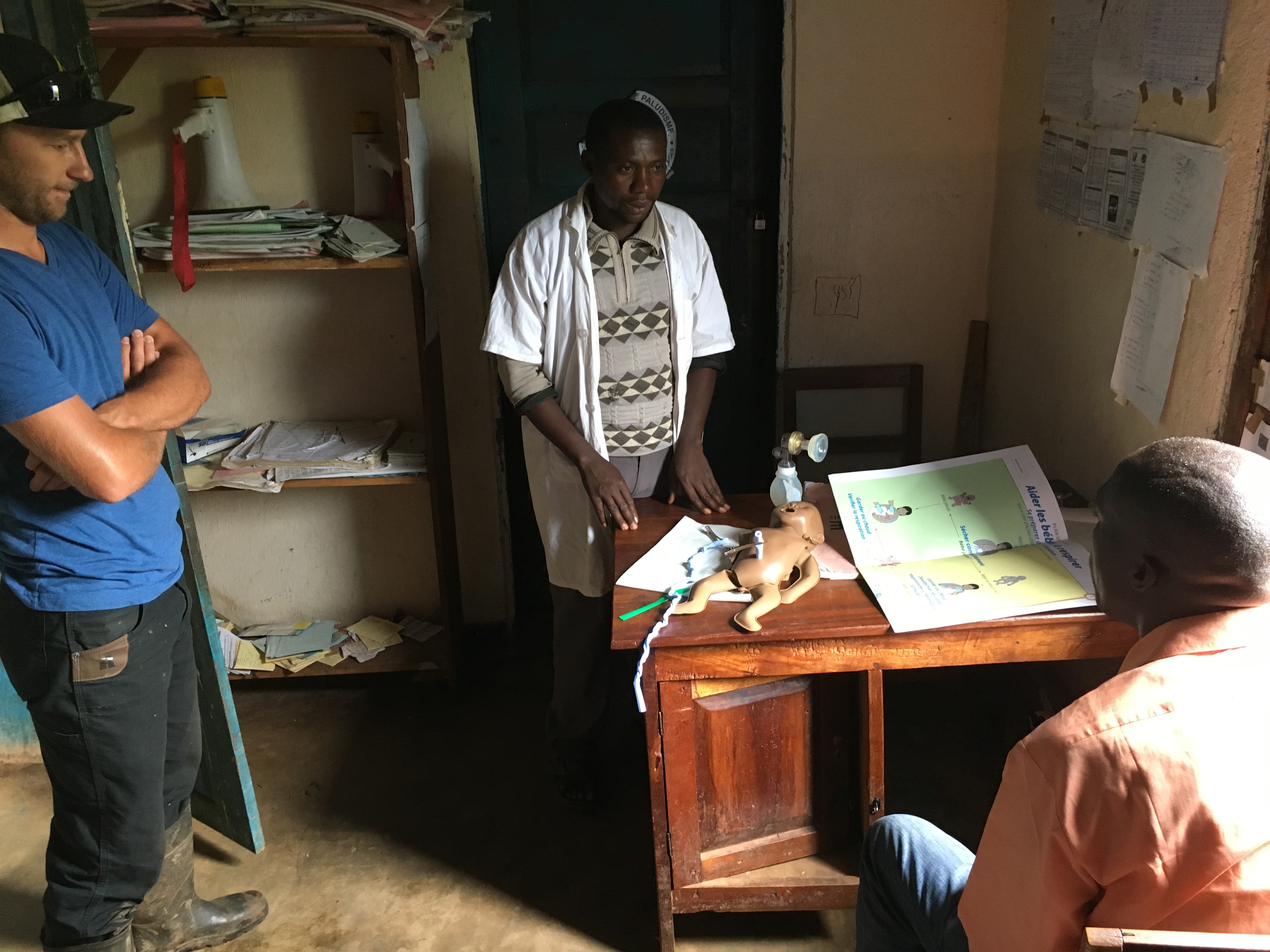
We also provided those clinic workers/midwives with a short refresher on the basics of the Helping Babies Breathe course using a training doll and other equipment provided by the midwives.
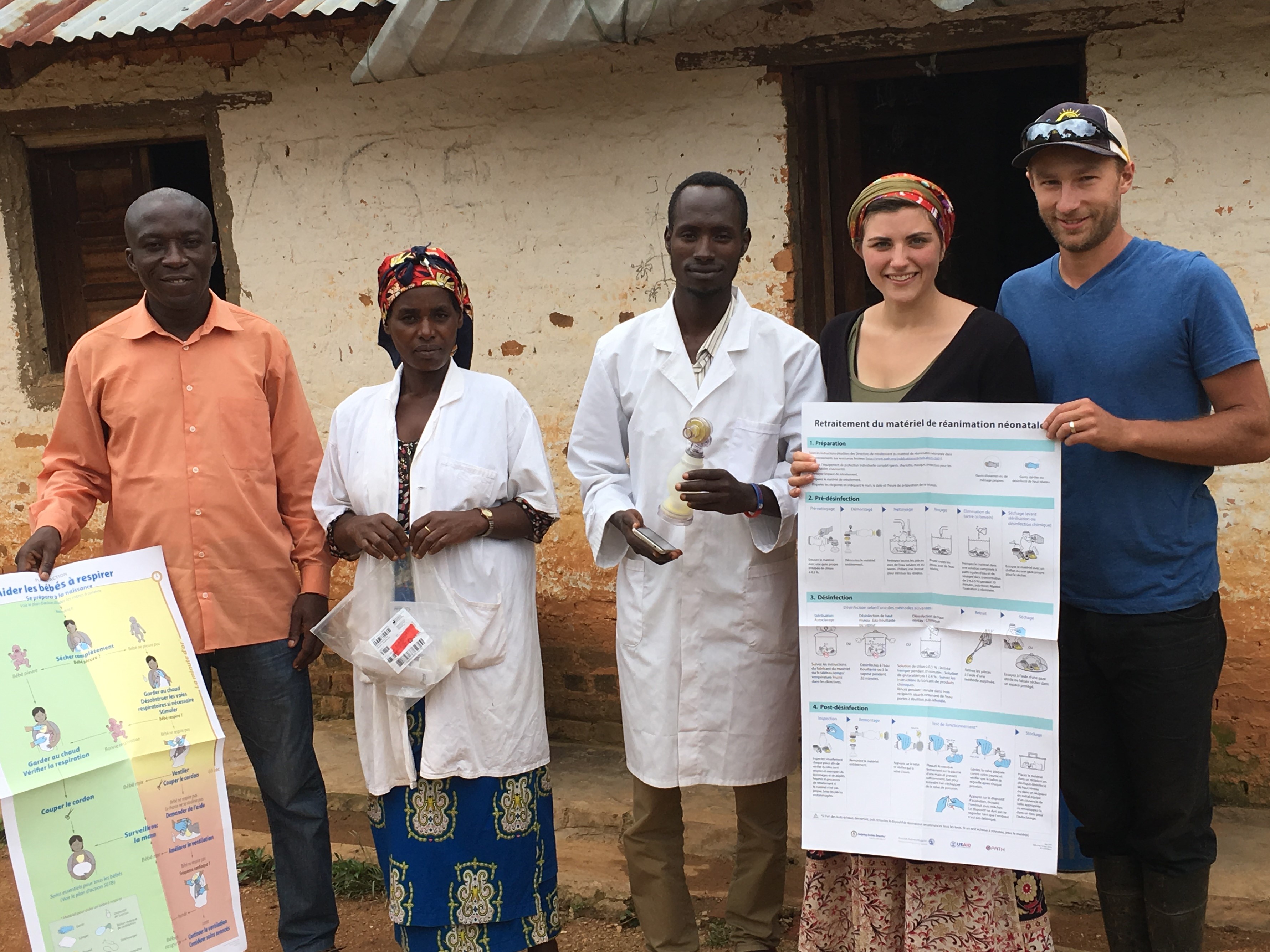
Our hope is to put on annual trainings with midwives from PRN, as well as develop an on-going refresher course to be used between the annual trainings.
I have been able to put this training and my other medical trainings to use at our local hospital as well. I’ve assisted with births and have experienced the struggle of having to make due with a lack of basic medical supplies. There are very few disposable medical gloves available so doctors and nurses conserve their gloves by not replacing them frequently. The alternative option is to not use gloves at all but there is no running water for them to wash their hands; this is in part because the hospital’s water pump is broken. Miles has evaluated this situation and said it would take approximately $600 (plus transportation) to fix the pump.
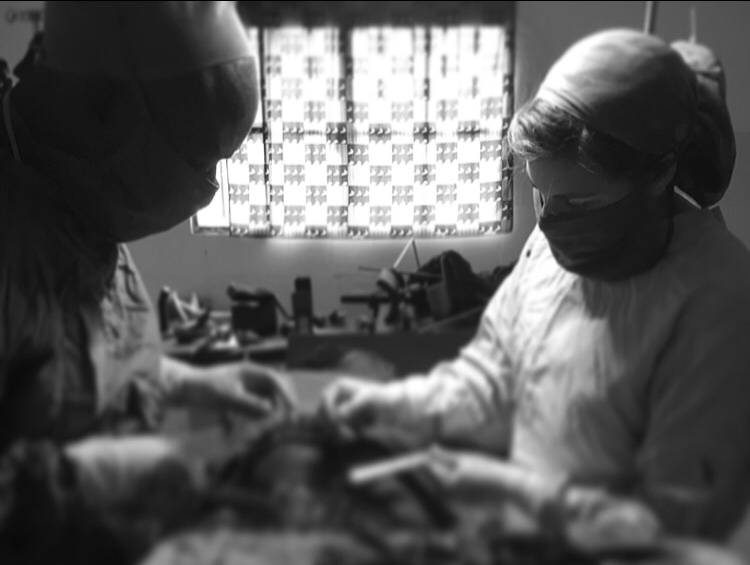
In the meantime, I carry my own gloves and hand sanitizer. Yes, hand sanitizer. With no running water, once I had to use the hand sanitizer to clean a suction bulb that I had just used during a cesarean birth fifteen minutes earlier. I cannot emphasize enough how critical clean, running water is in a hospital setting. One day, we’d like to see a better water system and proper solar power at the hospital and at the remote clinics as well.
Can I go home now?
All is well two weeks after the surgery. The post-operation testing showed that the cancer was only found in the prostate, which was fully removed, and I’m being a good boy through this slooooow healing process. Thanks to all for the love and support that’s been shown to us through this time.
Now that I’ve been able to catch my breath a bit, get ready for a steady stream of updates/posts about our work and life in Minembwe over the past several months, as a lack of Internet connection kept us from getting these out.
From this point forward, our updates, along with a website blog notice, will only be sent from LaOlamAfrica@gmail.com (via Mailchimp), as well as a link from our LaOlamAfrica Facebook page. If you received this email message from ONLY our personal address, northlandproductions@gmail.com, please keep reading. To easily correct this, please go into your Spam folder, find (or search) for a message with "LaOlam Africa Update" and mark "not spam." Adding our LaOlamAfrica@gmail.com email address to your contacts will also help our email not to be sent to Spam. Please email our daughter Demerey at this new address if you have any future troubles receiving our updates.
